Why you can trust Tom's Hardware
Windows 11: Core i9-12900K and i5-12600K Gaming Benchmarks — The TLDR
Below you can see the geometric mean of our gaming tests at 1080p and 1440p, with each resolution split into its own chart to give us a decent overall view of the current landscape. As usual, we're testing with an Nvidia GeForce RTX 3090 to reduce GPU-imposed bottlenecks as much as possible, and differences between test subjects will shrink with lesser cards or higher resolutions. You'll find further game-by-game breakdowns below. Most of the titles below show little meaningful differentiation at higher resolutions, so we only tested four of the seven titles at 1440p to analyze performance scaling. Additionally, it's easy to overwhelm the charts with multiple DDR4 and DDR5 results for each chip, so in an attempt to keep the charts as decipherable as possible, we're only presenting our DDR4 overclock performance results in this article. We'll post the DDR5 overclocking results to our CPU Benchmark hierarchy.
Due to Alder Lake's hybrid architecture, there will be teething pains with some games. As we reported, Denuvo DRM falsely identified Intel's E-cores as a separate system, and thus 91 Denuvo-enabled game titles wouldn't work with Alder Lake chips. Intel has worked with Denuvo, and the software maker issued a flurry of game patches to fix the issue. However, some titles are still not patched, though more patches are incoming. [EDIT: As of December 2021, only three games remain unpatched] Intel says that all games should eventually work with Alder Lake. We didn't encounter any issues with Denuvo in our testing, thanks to our gaming test suite
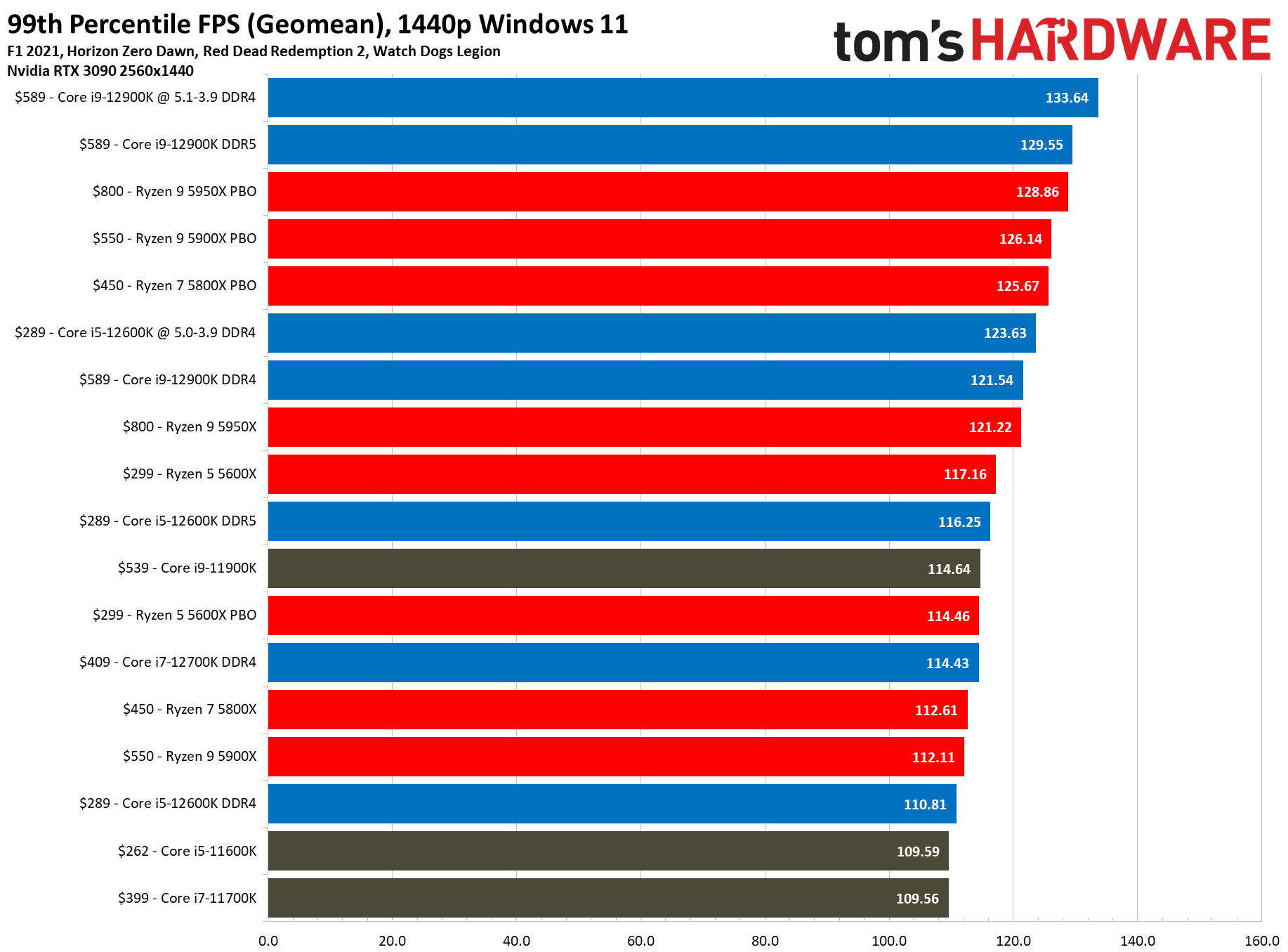
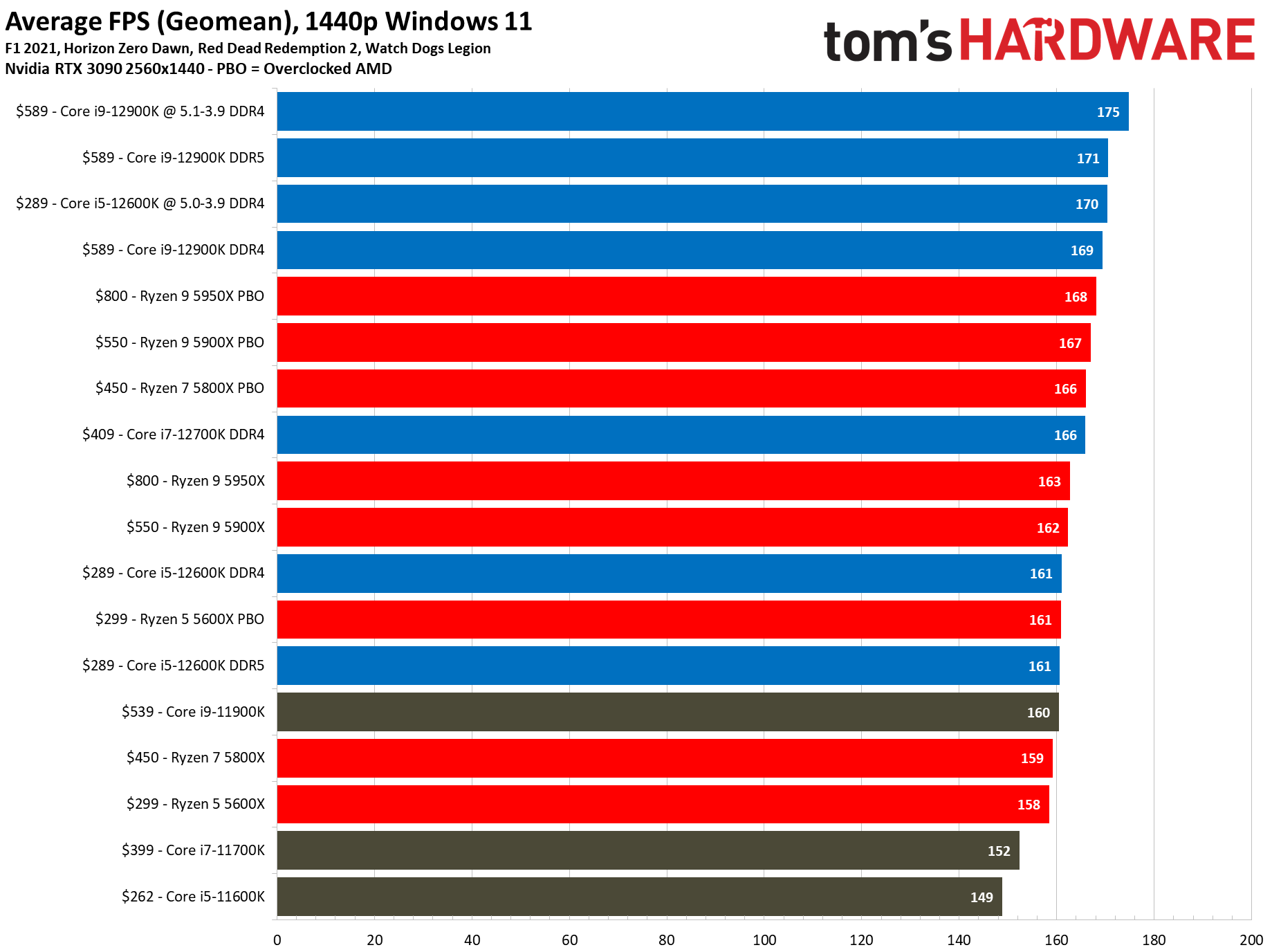
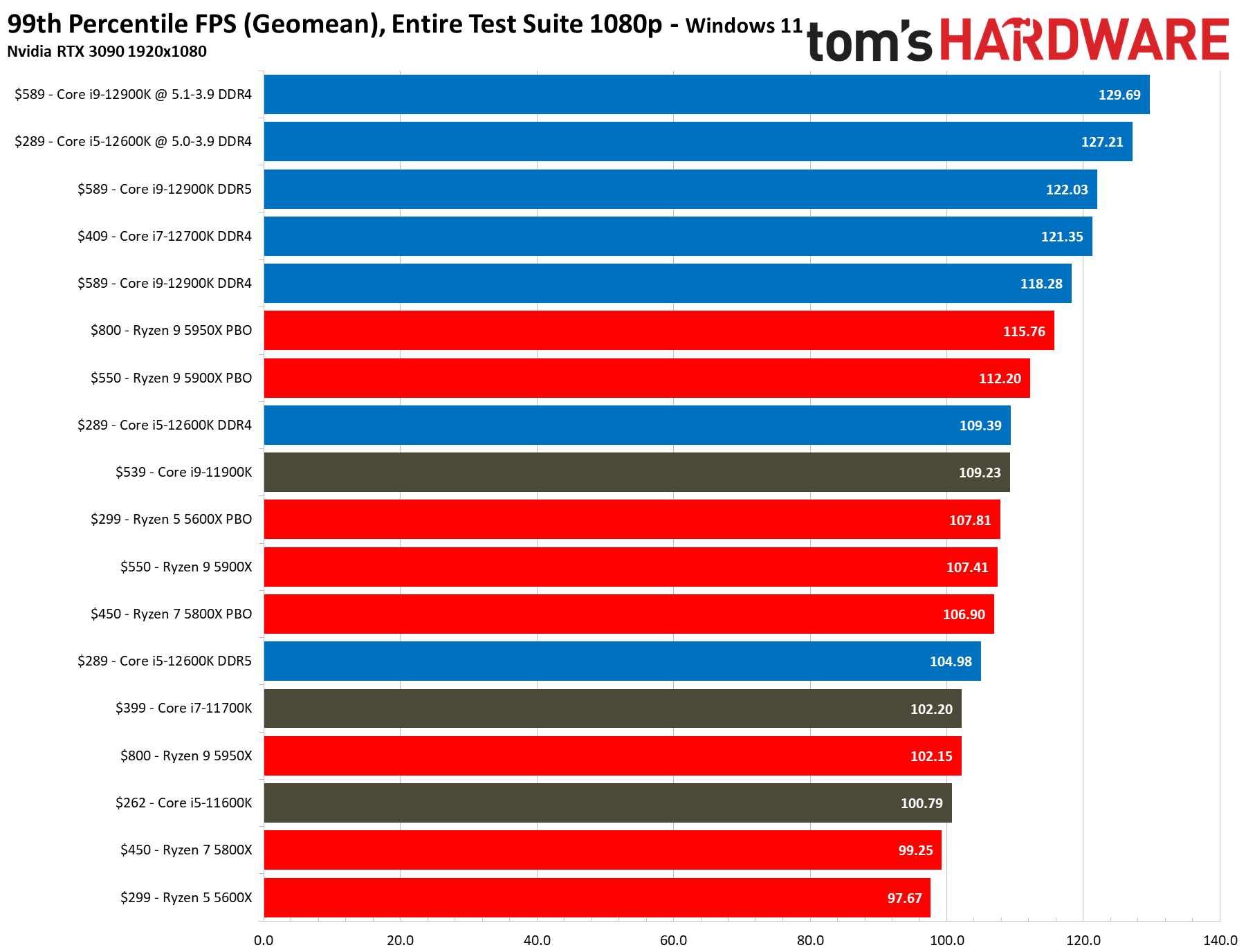
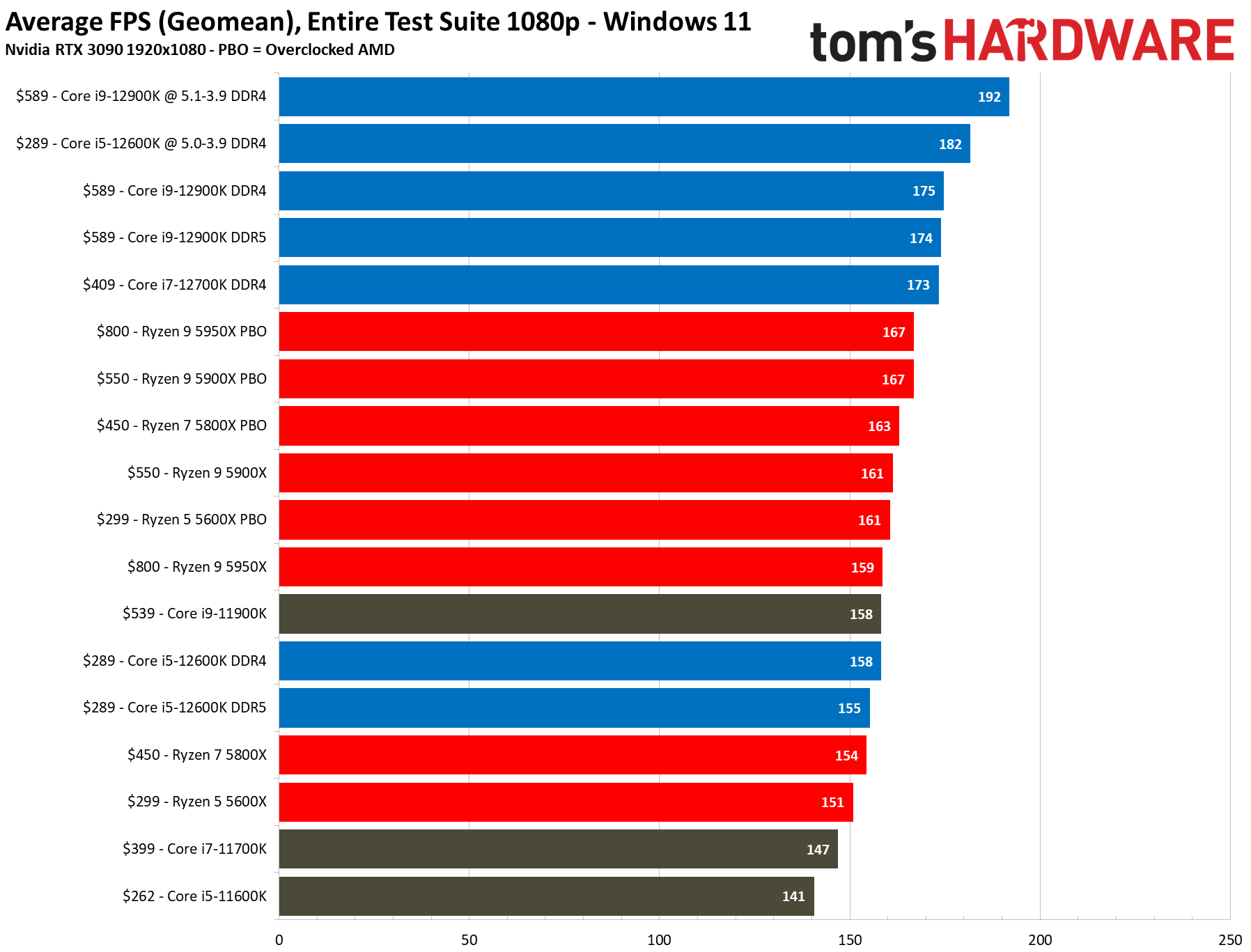
The $549 12-core Ryzen 9 5900X is AMD's fastest gaming chip, but the $589 Core i9-12900K is 8.7% faster in the cumulative 1080p gaming measurement across our entire test suite. And that's with both the DDR4 and DDR5 memory configurations, so you won't have to drop serious cash on a DDR5 kit to get there.
Stepping down $300, the $289 Core i5-12600K with DDR5 memory is ~2.7% faster than the $299 Ryzen 5 5600X, but that gap widens slightly with less expensive DDR4 memory. The Core i5-12600K also effectively ties the Ryzen 7 5800X, but for $161 less.
Rocket Lake buyers will be plenty disappointed. The Core i9-11900K landed a mere six months ago at $539, but the 12900K is ~11% faster in gaming. It's also much faster in the threaded workloads that we'll see later in our application testing. We see a similar story unfold with the Core i5-11600K compared to the 12600K, with 9% more performance in gaming coming for $27 more.
Naturally, moving over to 1440p brings a GPU bottleneck into the equation, so the performance deltas between the chips shrink tremendously. Here the Core i5-12600K effectively ties the 5600X and 5800X, while the 12900K is a mere 3.6% faster than the Ryzen 9 5950X.
Flipping through the 99th percentile charts shows larger deltas, but we have to view those with caution as Windows 11 is still young and seems to suffer from more framerate variability than our Windows 10 test platform. This could result from yet-to-be-updated game code, the relatively new graphics drivers for Windows 11, or some other combination of factors that could be smoothed out in the future.
The Alder Lake chips profit more from overclocking than the AMD Ryzen models. After tuning, the Core i9-12900K with DDR4 was 9.7% faster than the stock configuration at 1080p. Meanwhile, the Core i5-12600K jumped 15%, which is more than we would expect from the gains we see with new chip generations. In fact, it's been a long time since we've seen double-digit overclocking performance gains in gaming from easily-attainable frequencies.
Overall, the Alder Lake chips are a boon for enthusiasts. By comparison, the overclocked Ryzen chips were anywhere from 3.7% to 6.6% faster after tuning. You can read more about our overclock settings on the overclocking page.
Intel's Alder Lake carves out a win in Windows 11, but large performance deltas in a few of the game titles can heavily impact these types of cumulative measurements. For instance, Intel enjoys a sizeable lead in Hitman 3, but that game is specifically tuned to leverage the E-cores effectively by offloading low-priority tasks like physics to the small cores. That can be seen as an advantage by some because more game devs could take this approach, or as a fluke by others that think this type of optimization will only come to Intel-sponsored titles.
The competition between Intel and AMD is absolutely closer now, so it's best to make an informed decision based on the types of titles you play frequently. Be sure to check out the individual tests below.
Windows 11: 3DMark, VRMark, Chess Engines on Intel Core i9-12900K
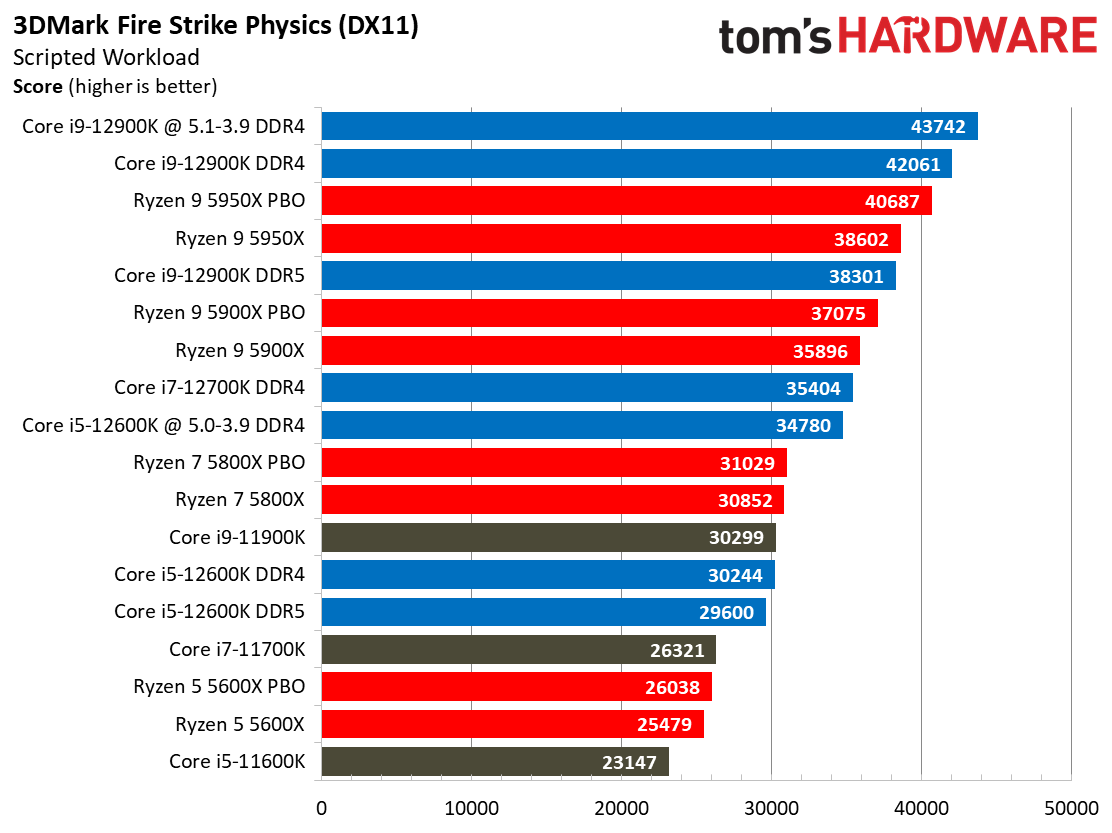
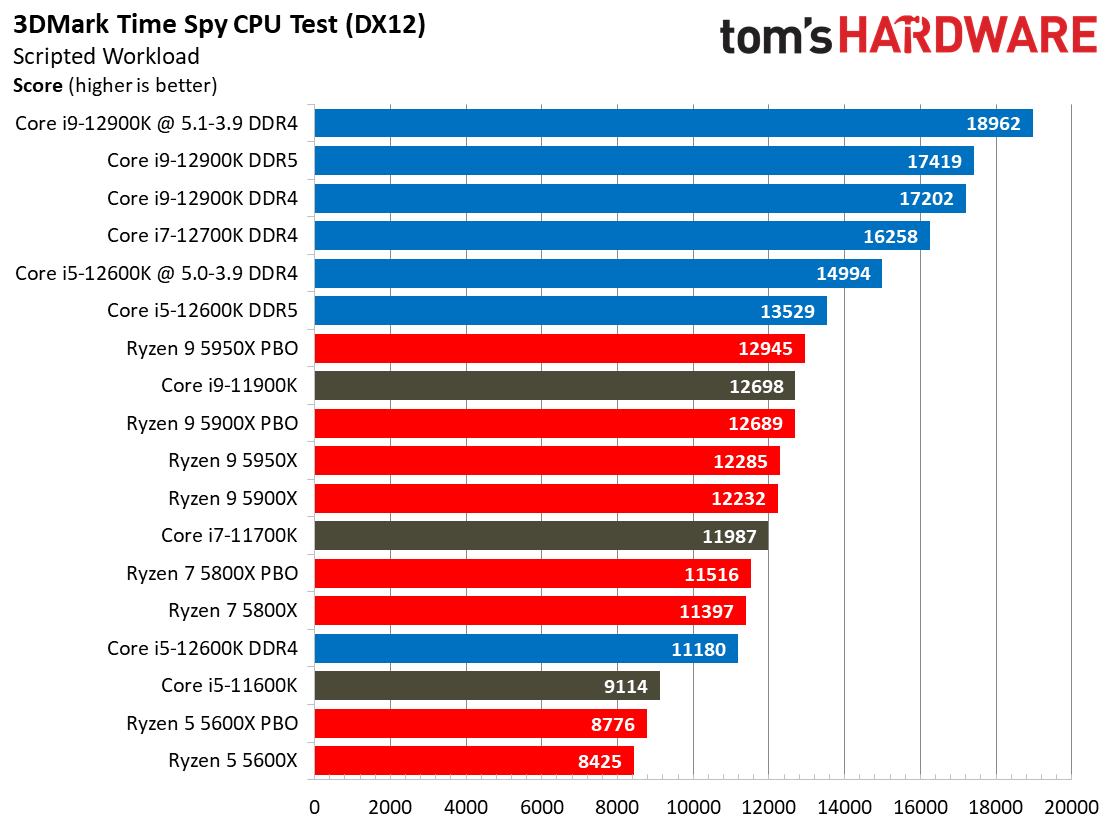
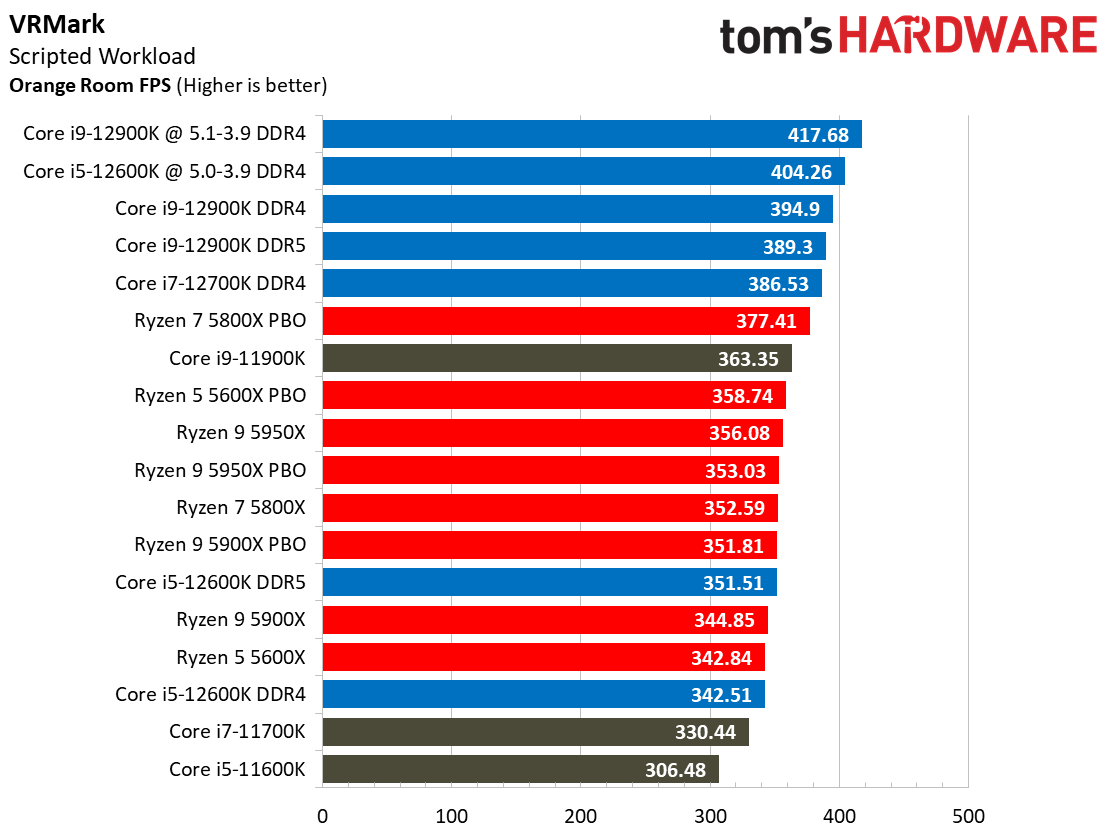
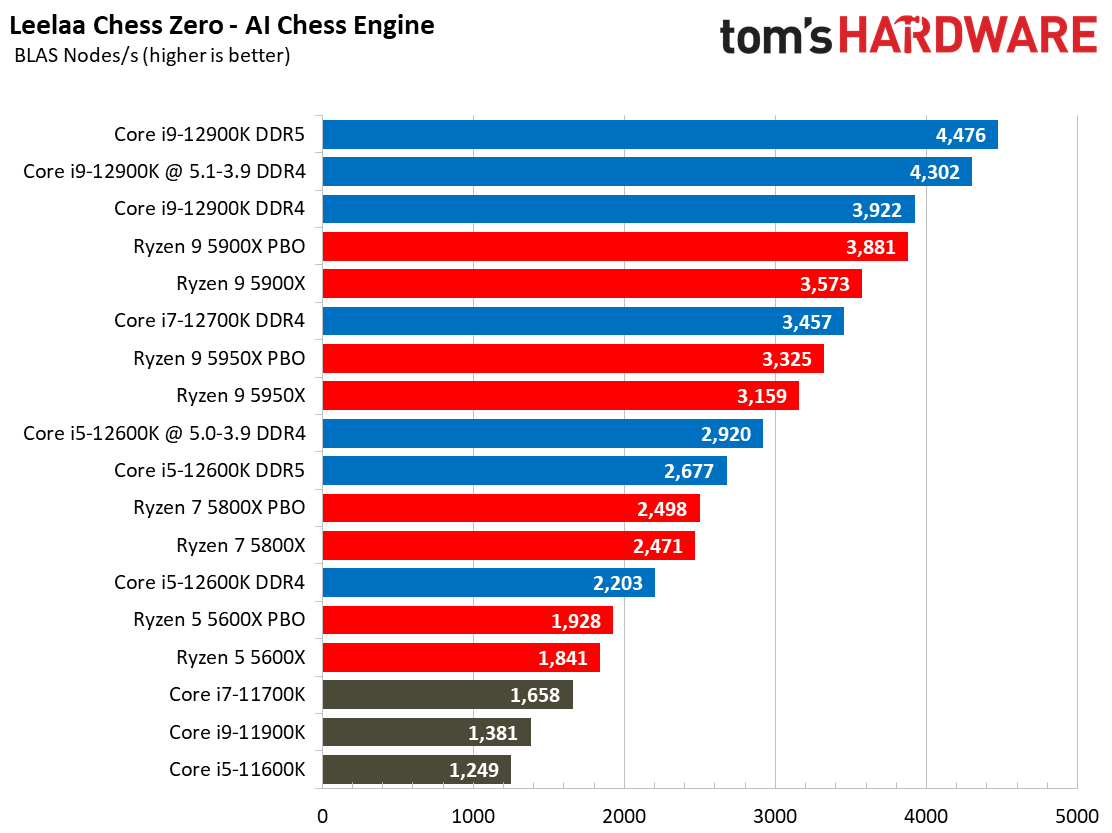
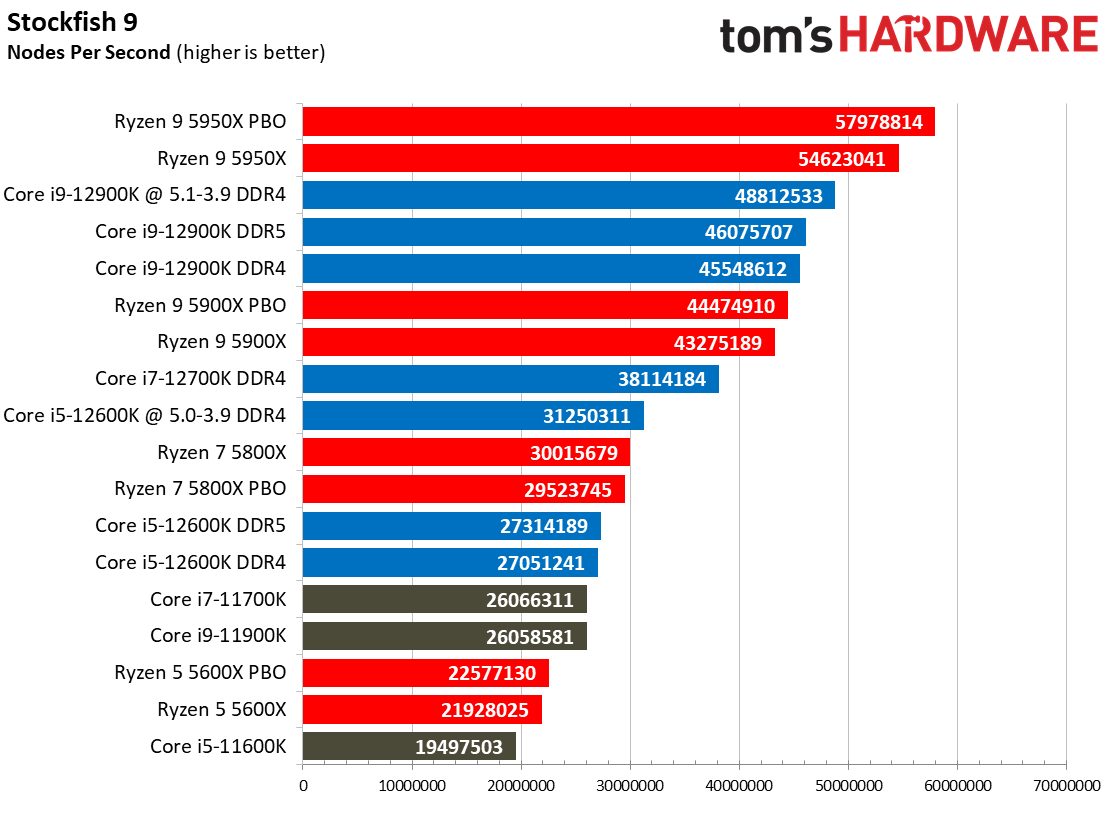
Synthetic benchmarks don't tend to translate well to real-world gaming, but they do show us the raw amount of compute power exposed to game engines. It's too bad most games don't fully exploit it.
The Core i9-12900K is a whopping 41% faster than the Ryzen 9 5950X in the 3DMark Time Spy CPU test, but as we've seen with most of the Windows 11 gaming benchmarks, it doesn't pick up too much additional performance by using DDR5.
We can't say the same for the 12600K, at least in this benchmark. The 12600K with DDR5 is 21% faster than it is with DDR4, and it easily leads the Ryzen 5 5600X in both configurations. Surprisingly, the DDR4 configurations yield tangible performance gains in the DX11 Fire Strike physics benchmark, with the 12900K with DDR4 being ~10% faster than the DDR5 config.
We've added the open-source neural network-based Leela chess engine to our benchmark roster. As evidenced by the DDR5 test results, this AI-powered engine obviously scales better with more memory throughput than the Stockfish engine.
Far Cry 6 on Core i9-12900K and Core i5-12600K
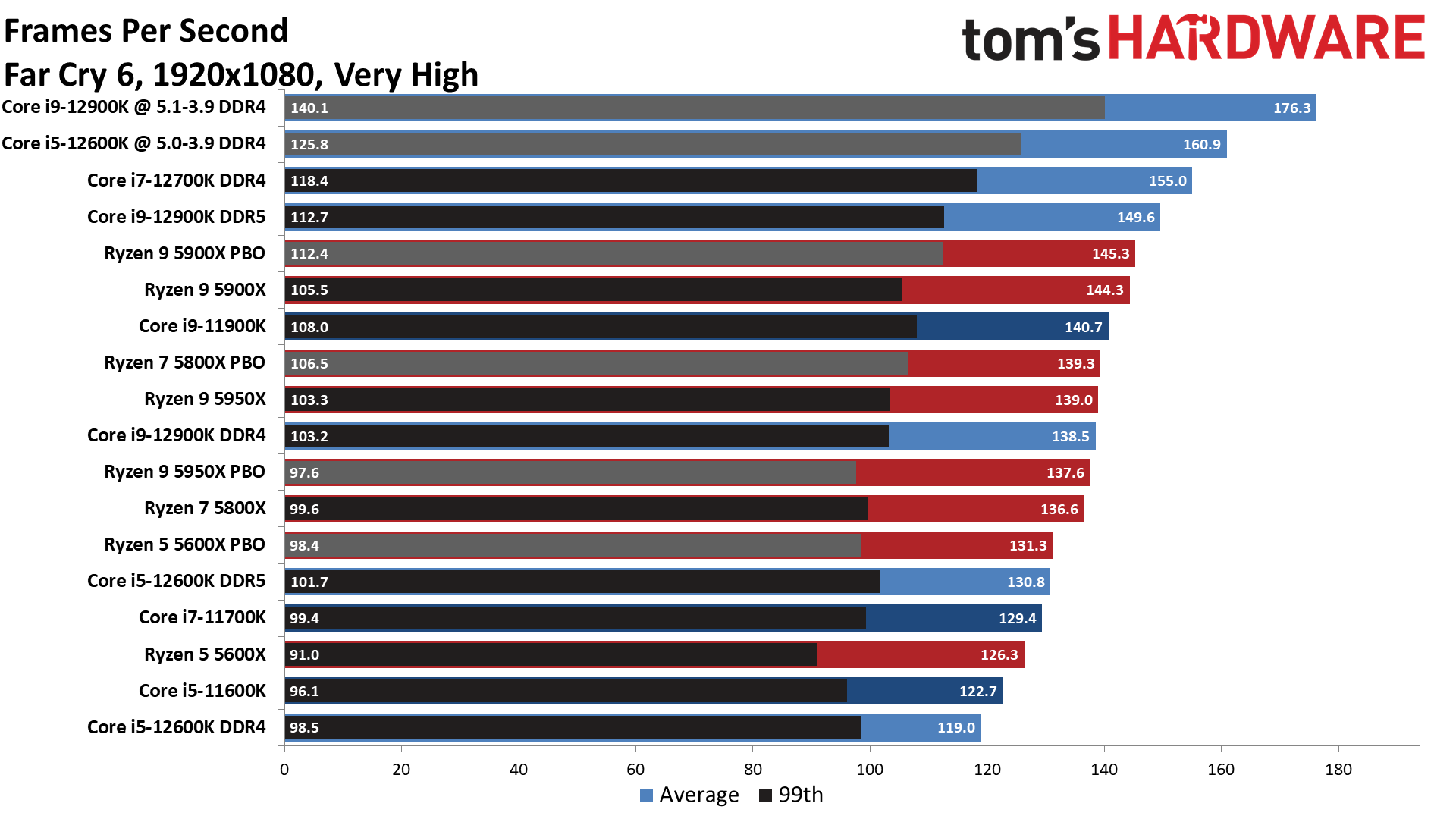
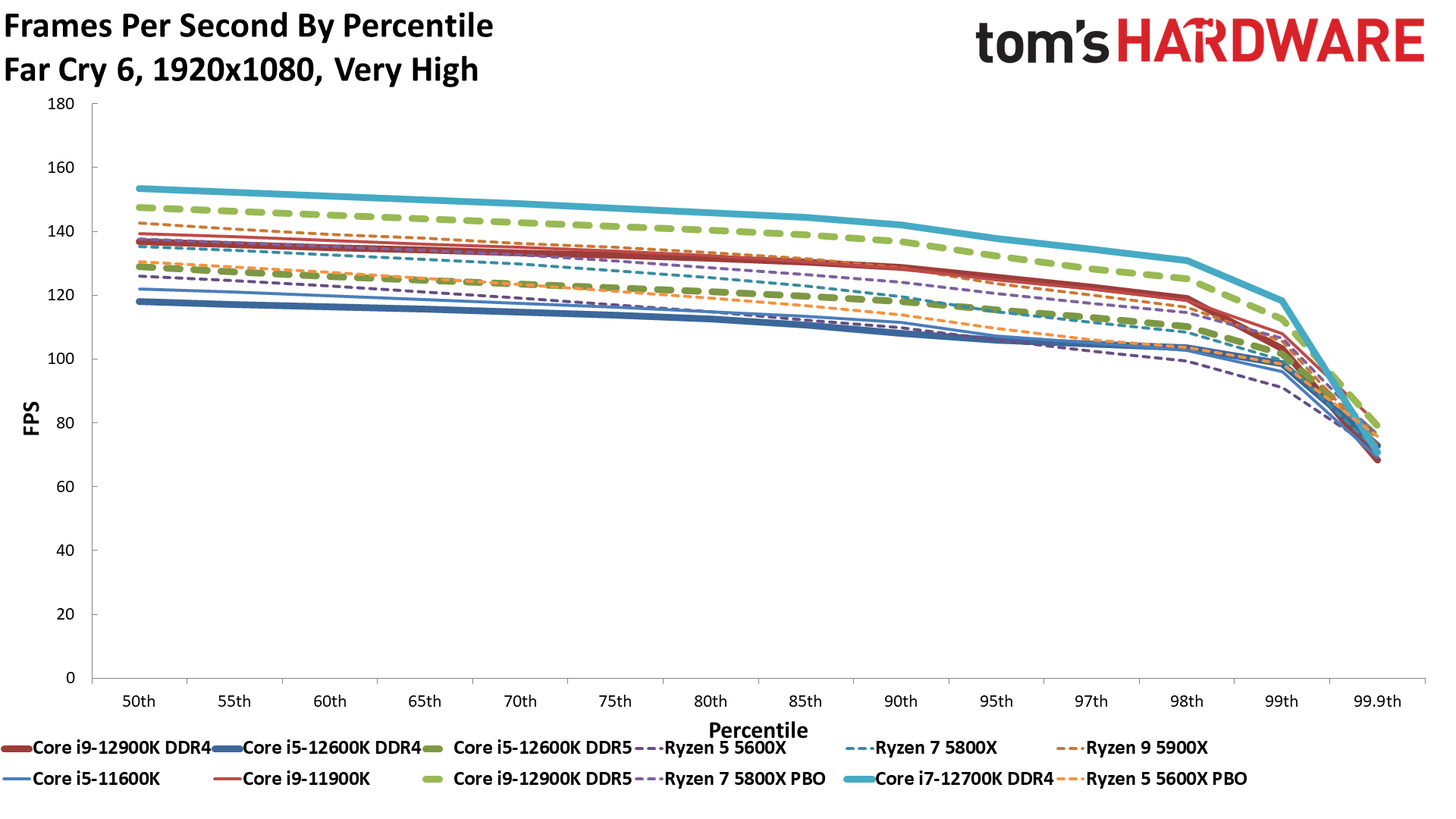
F1 2021 on Core i9-12900K and Core i5-12600K
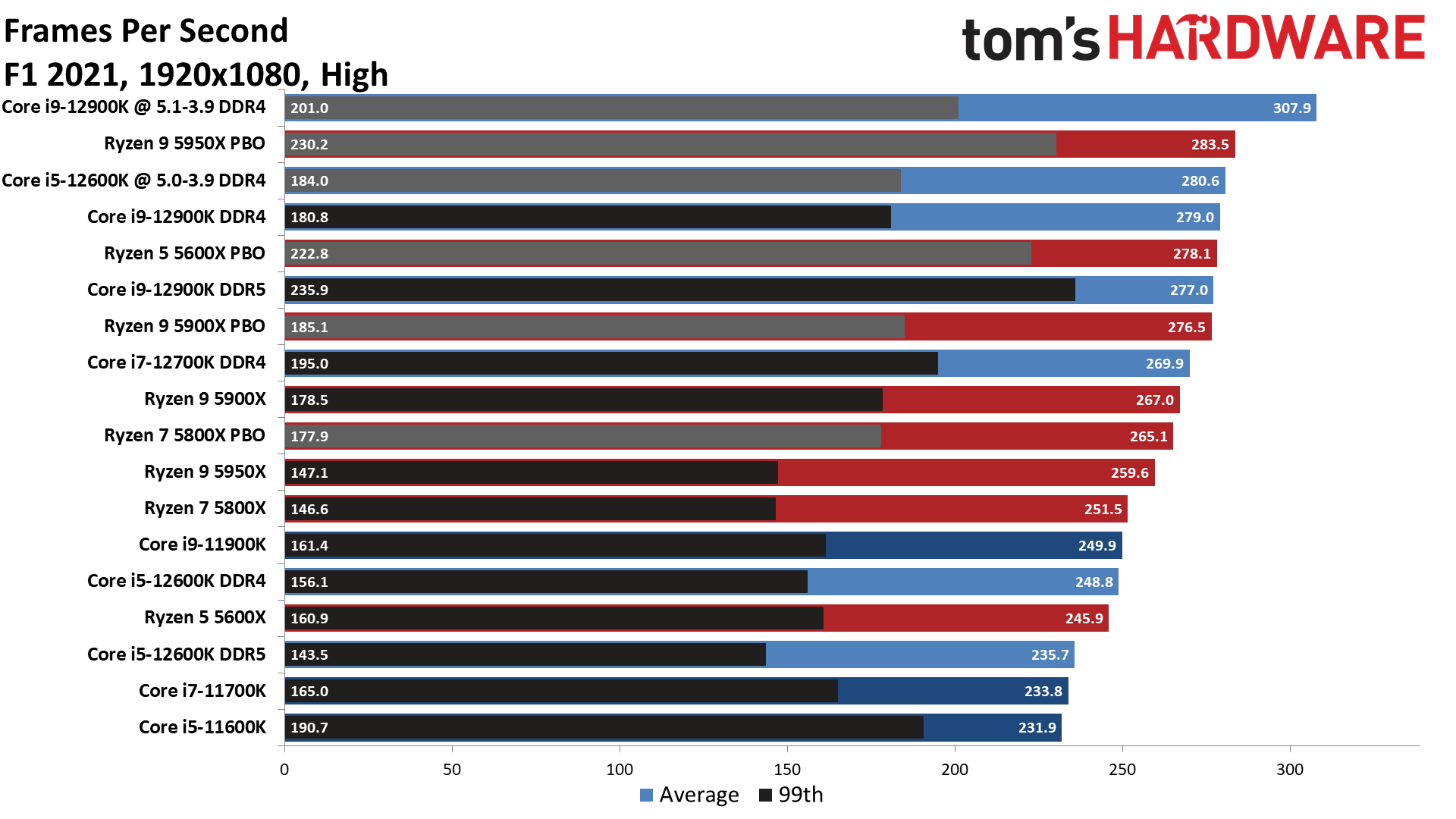
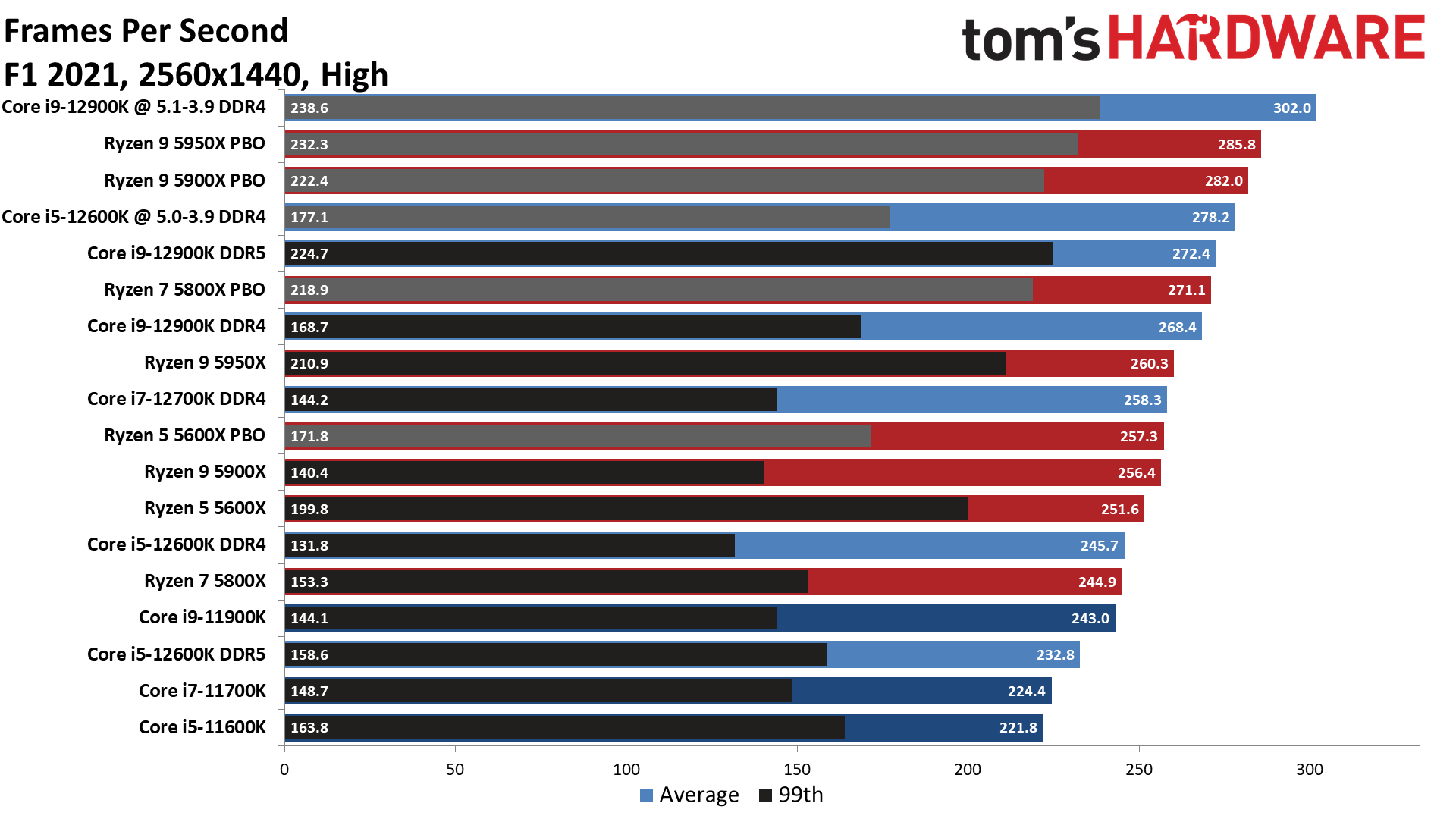
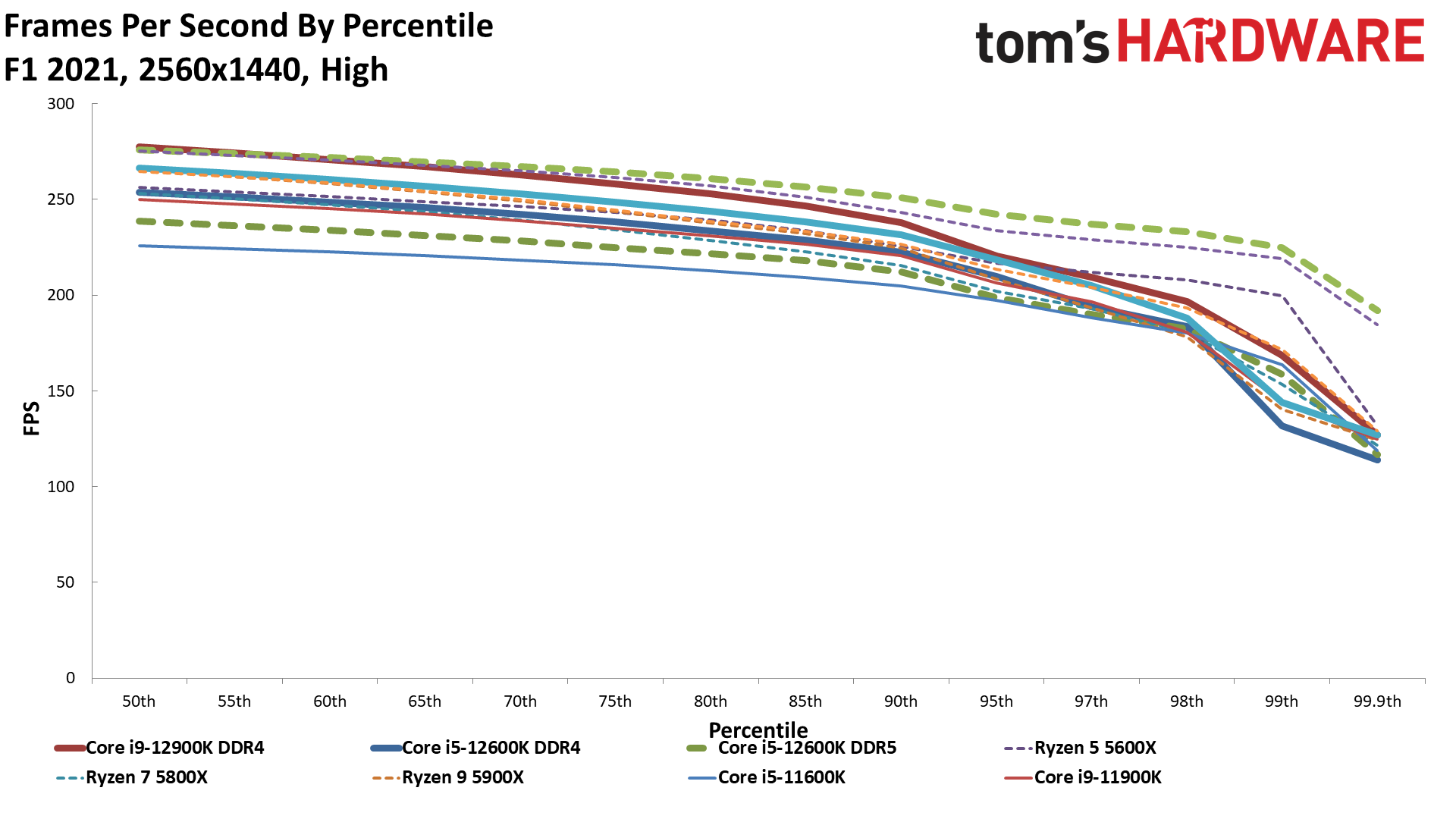
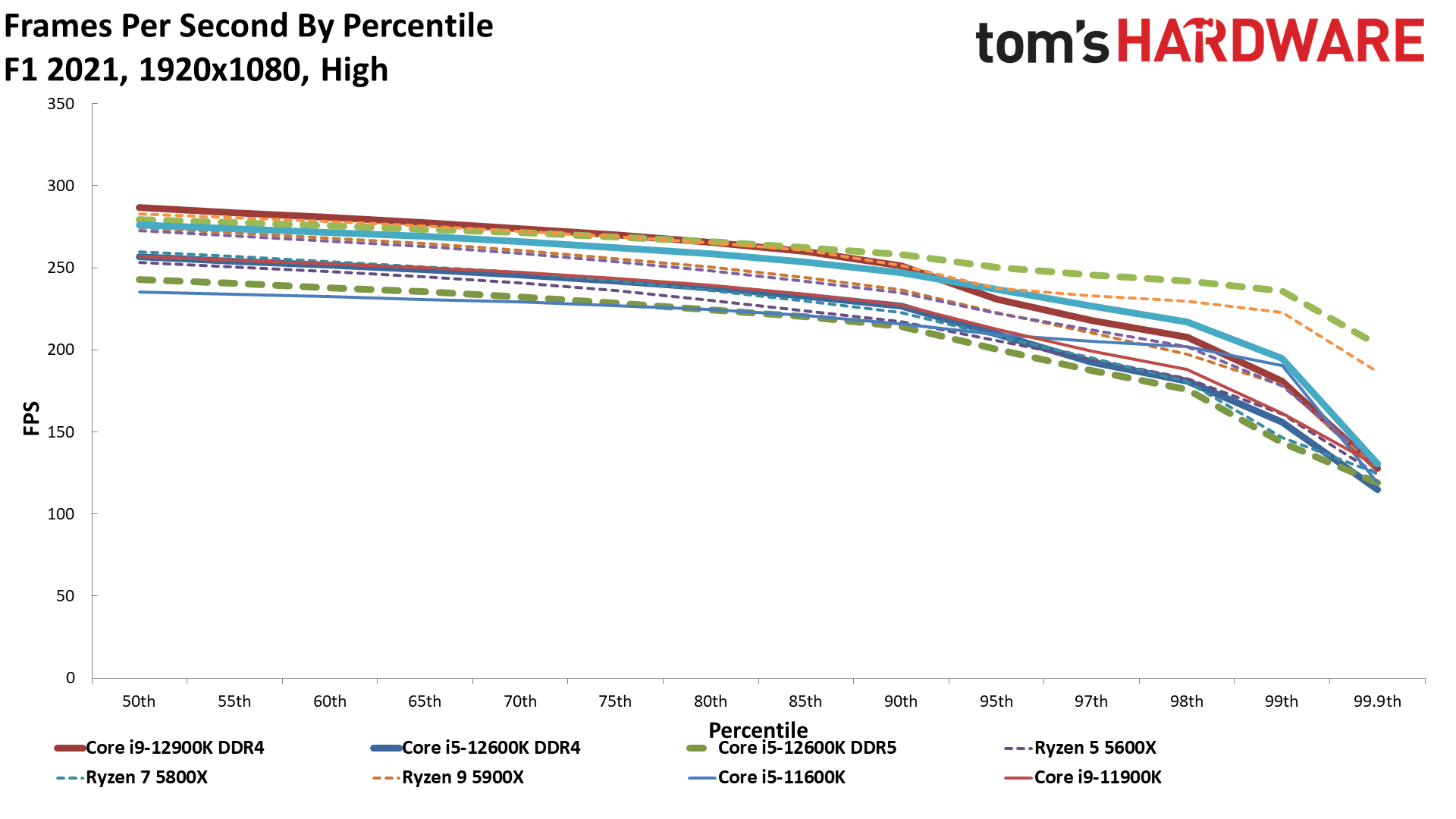
Hitman 3 on Core i9-12900K and Core i5-12600K
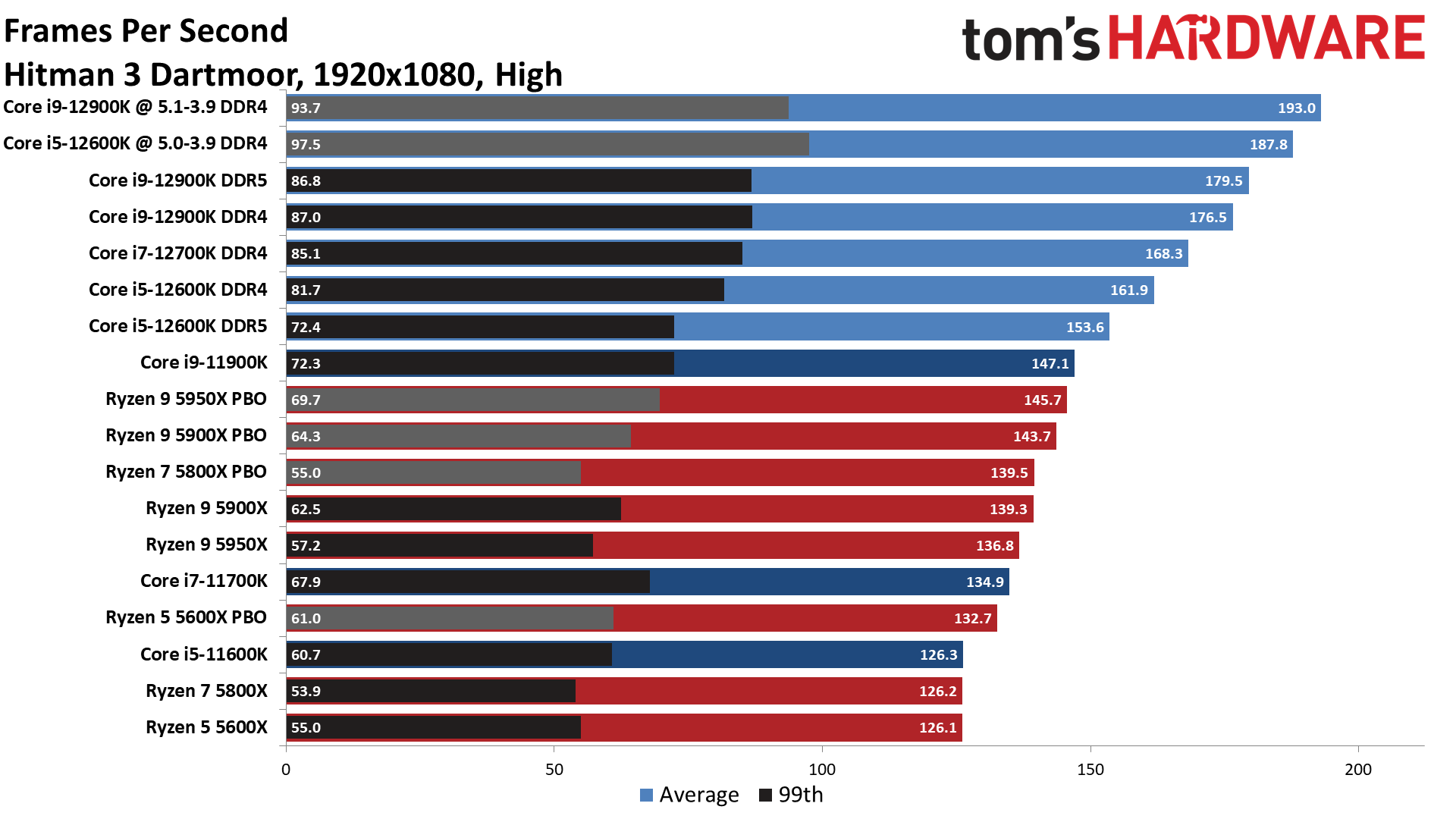
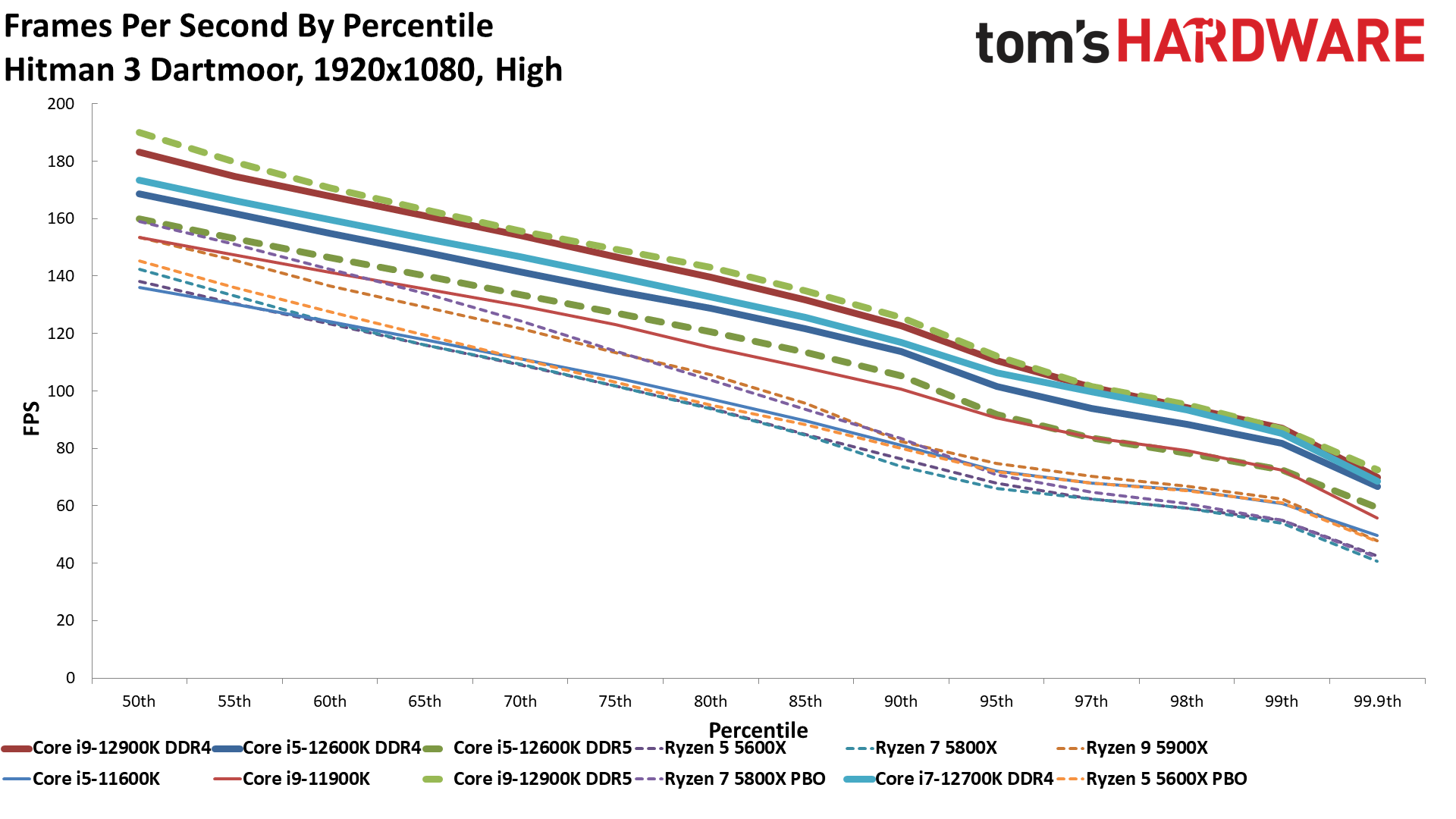
Horizon Zero Dawn on Core i9-12900K and Core i5-12600K
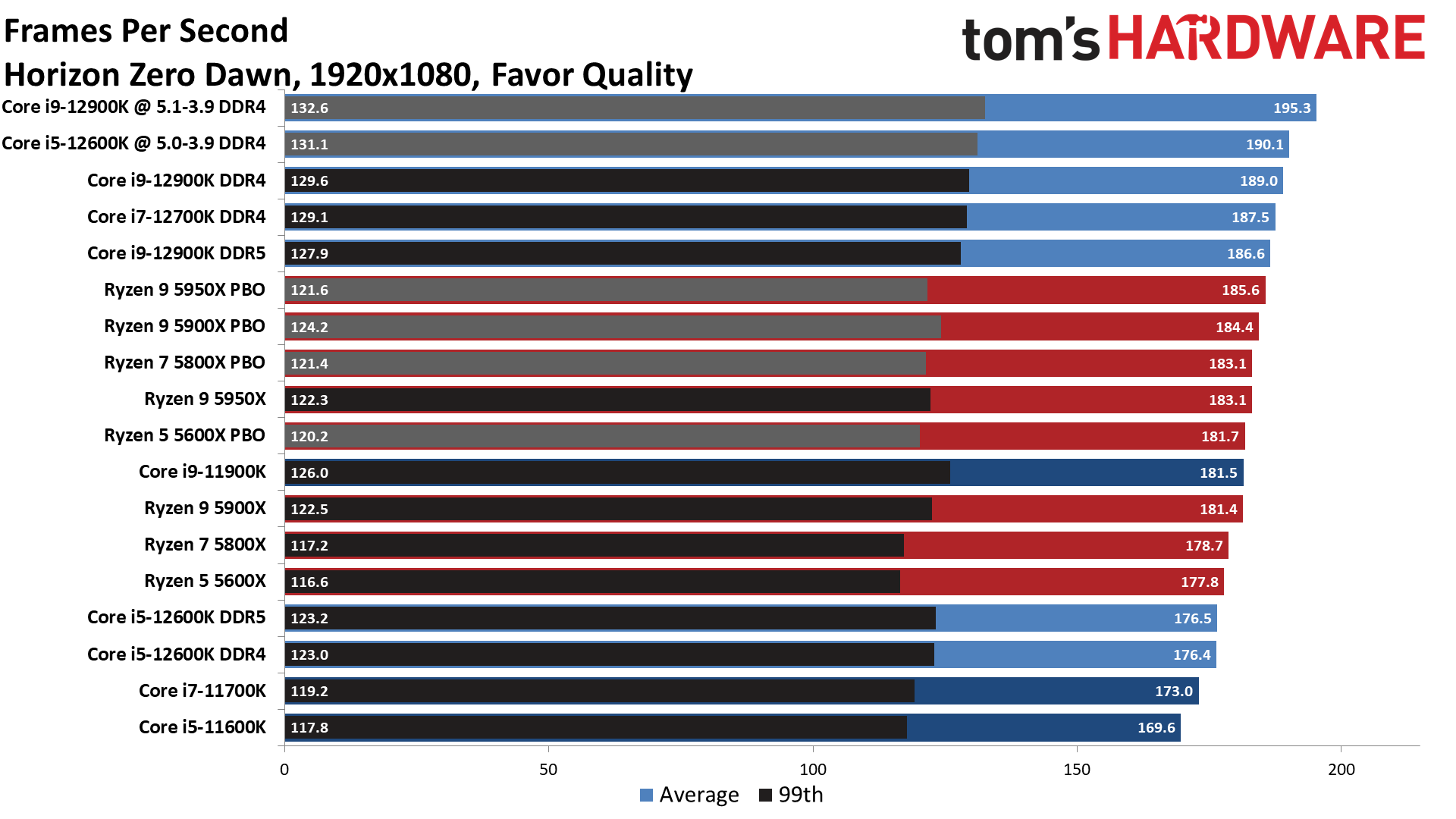
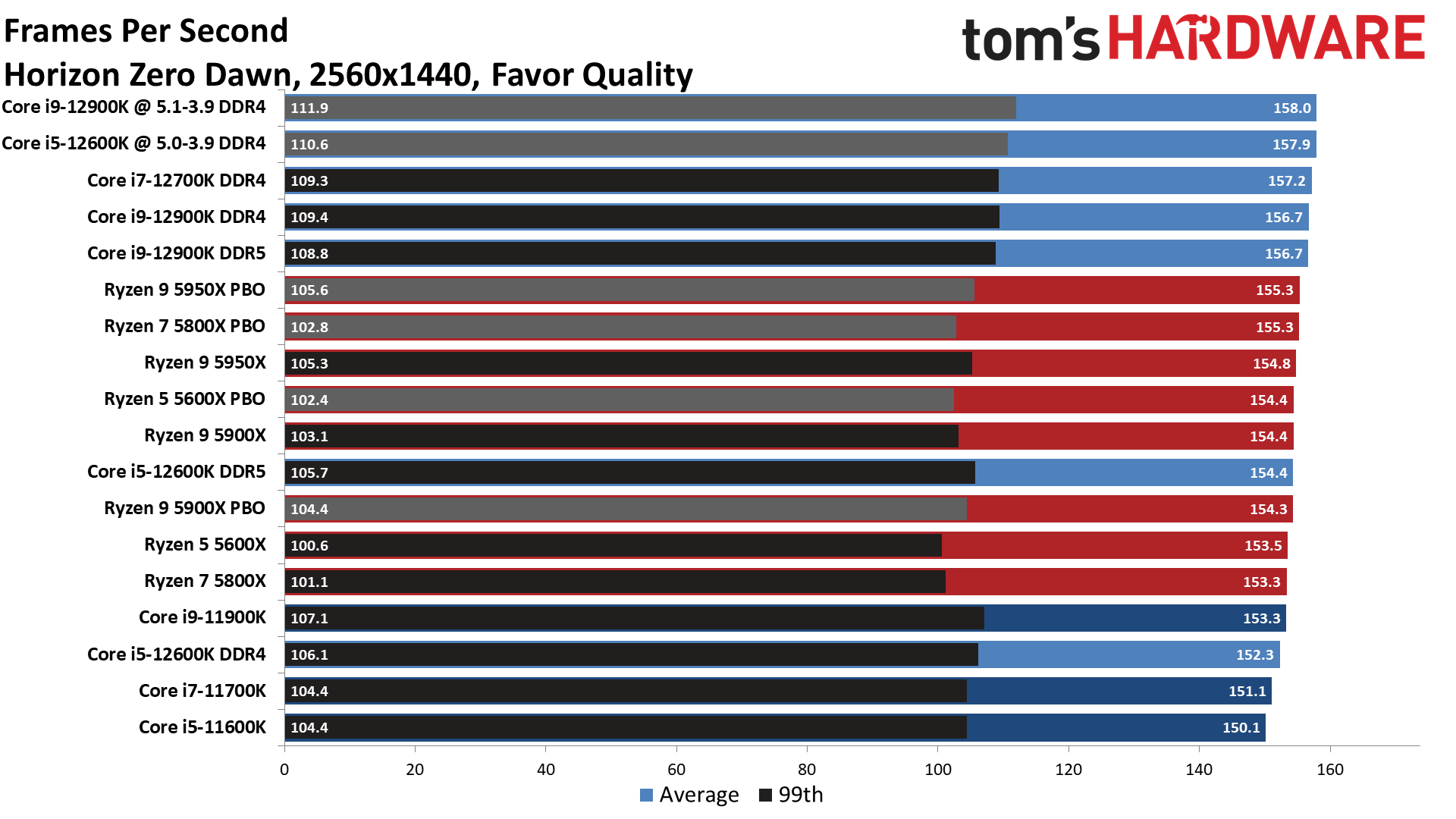
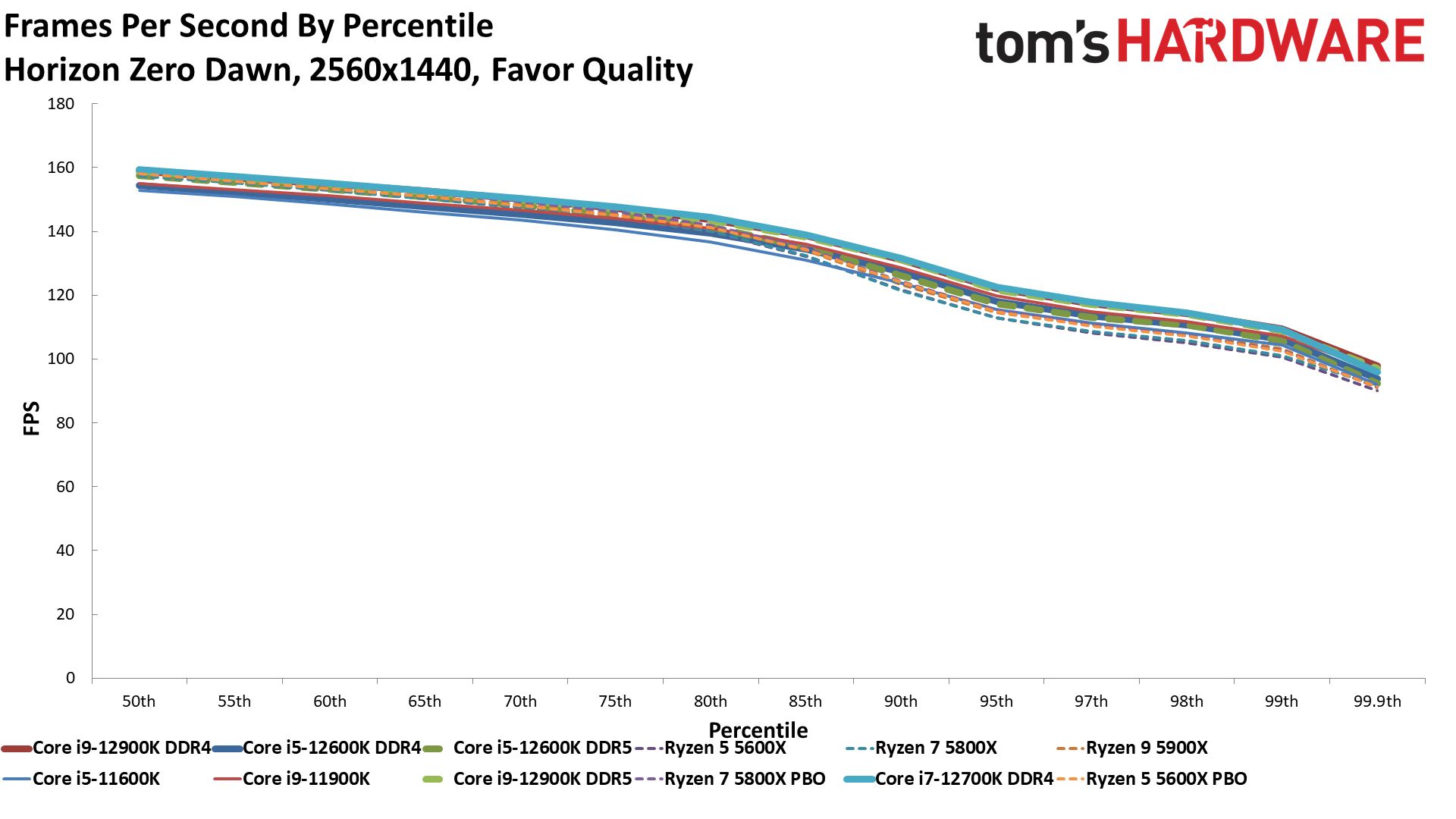
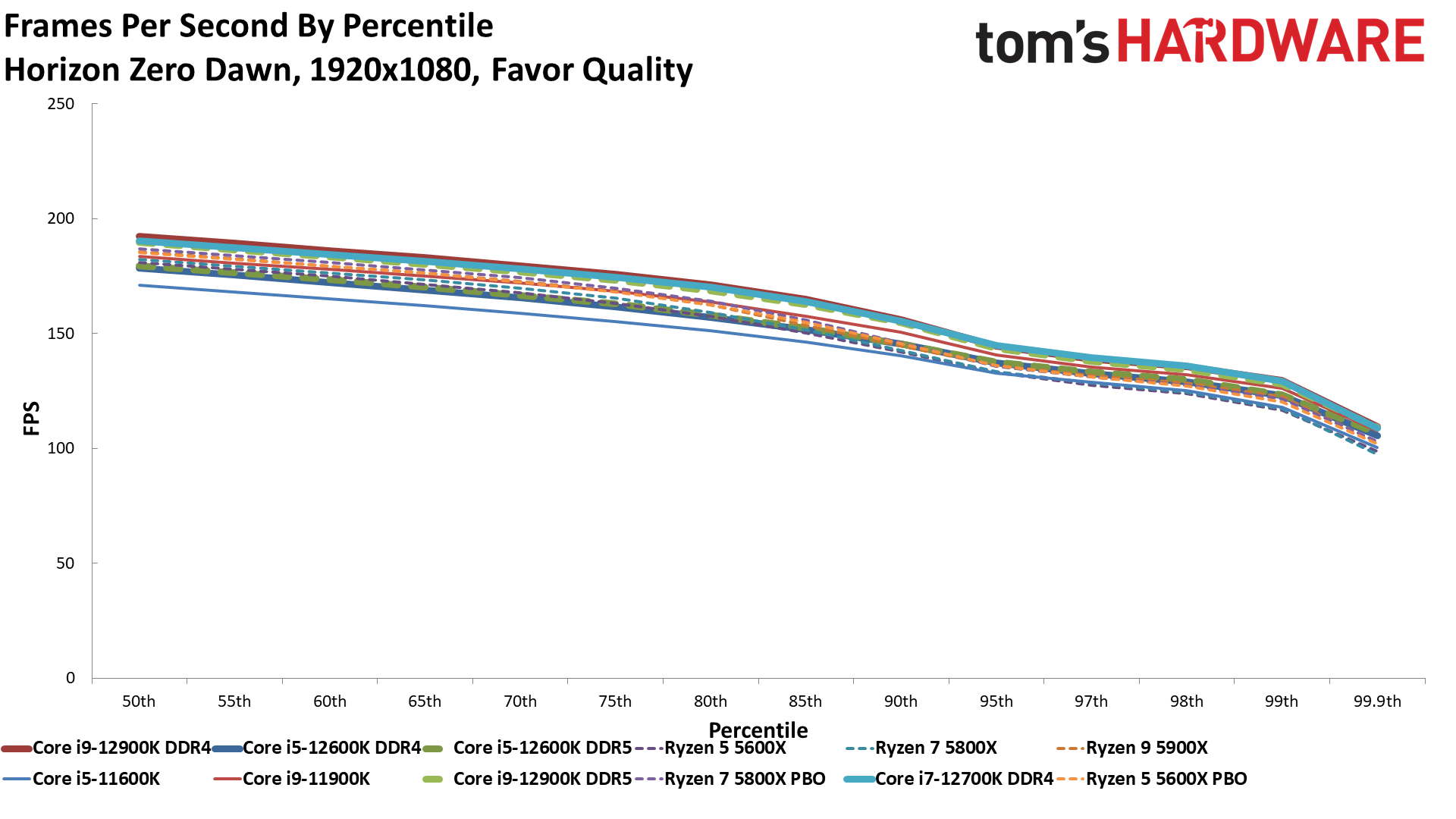
Microsoft Flight Simulator 2021 on Core i9-12900K and Core i5-12600K
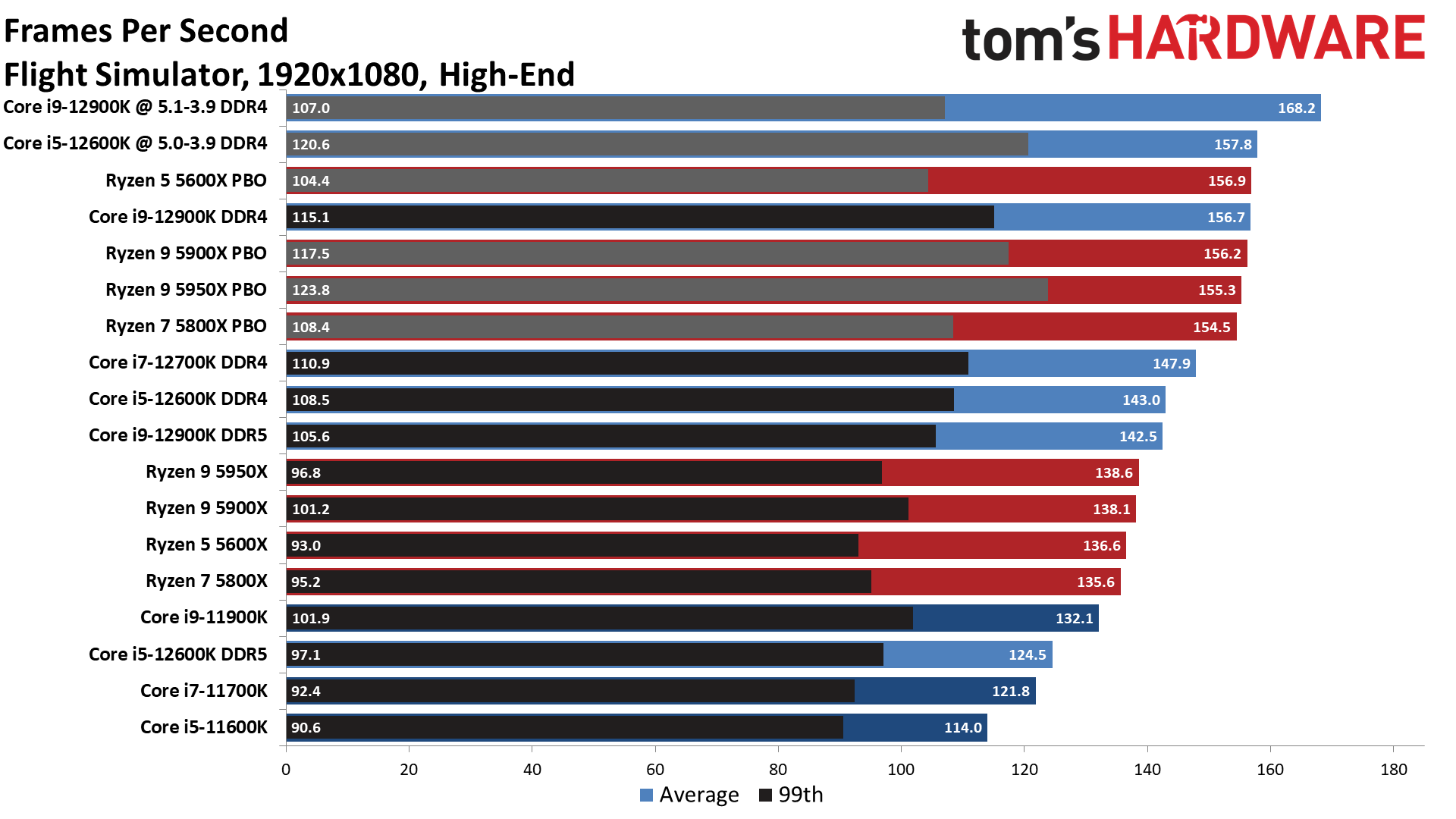
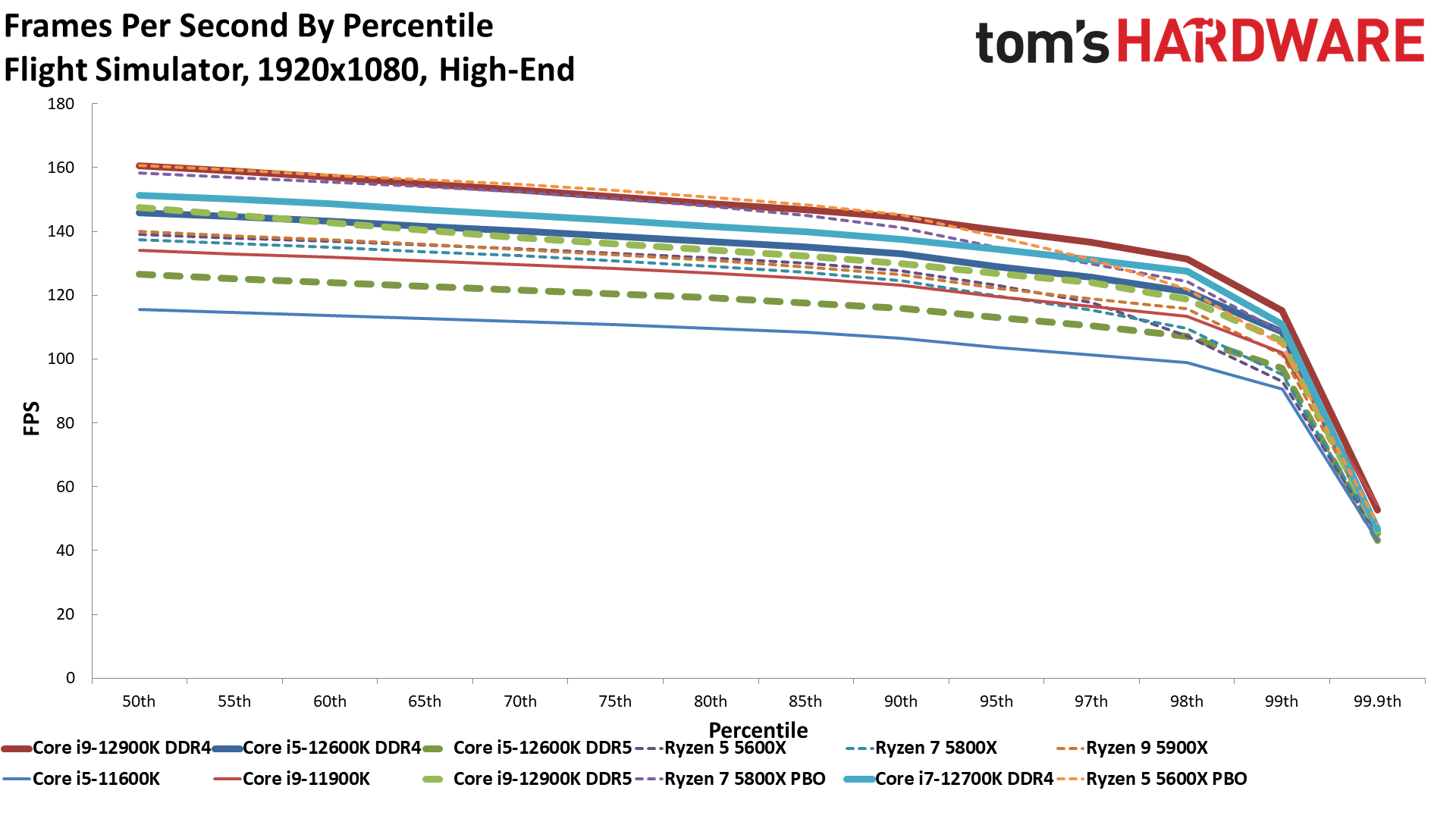
Red Dead Redemption 2 on Core i9-12900K and Core i5-12600K
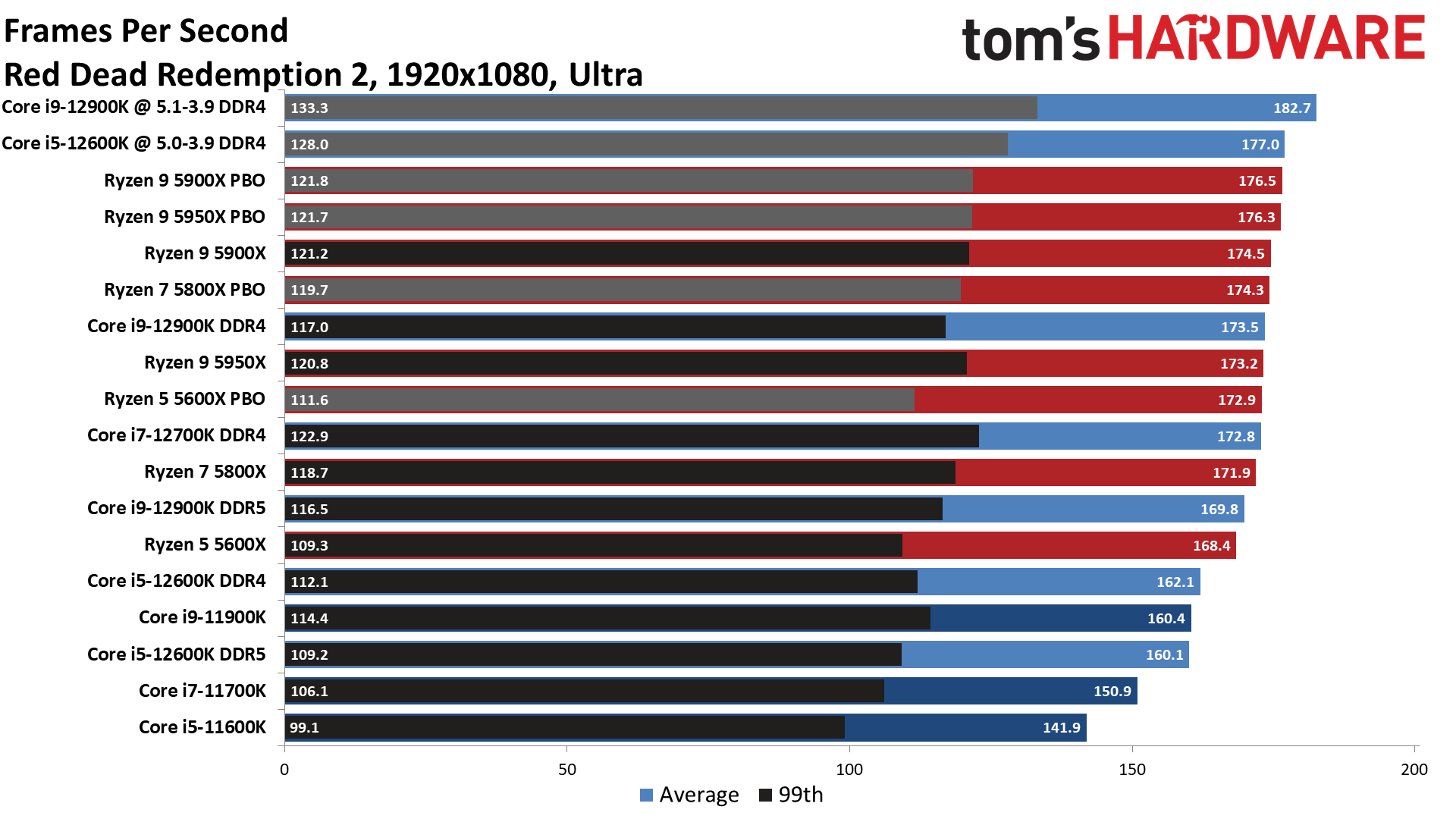
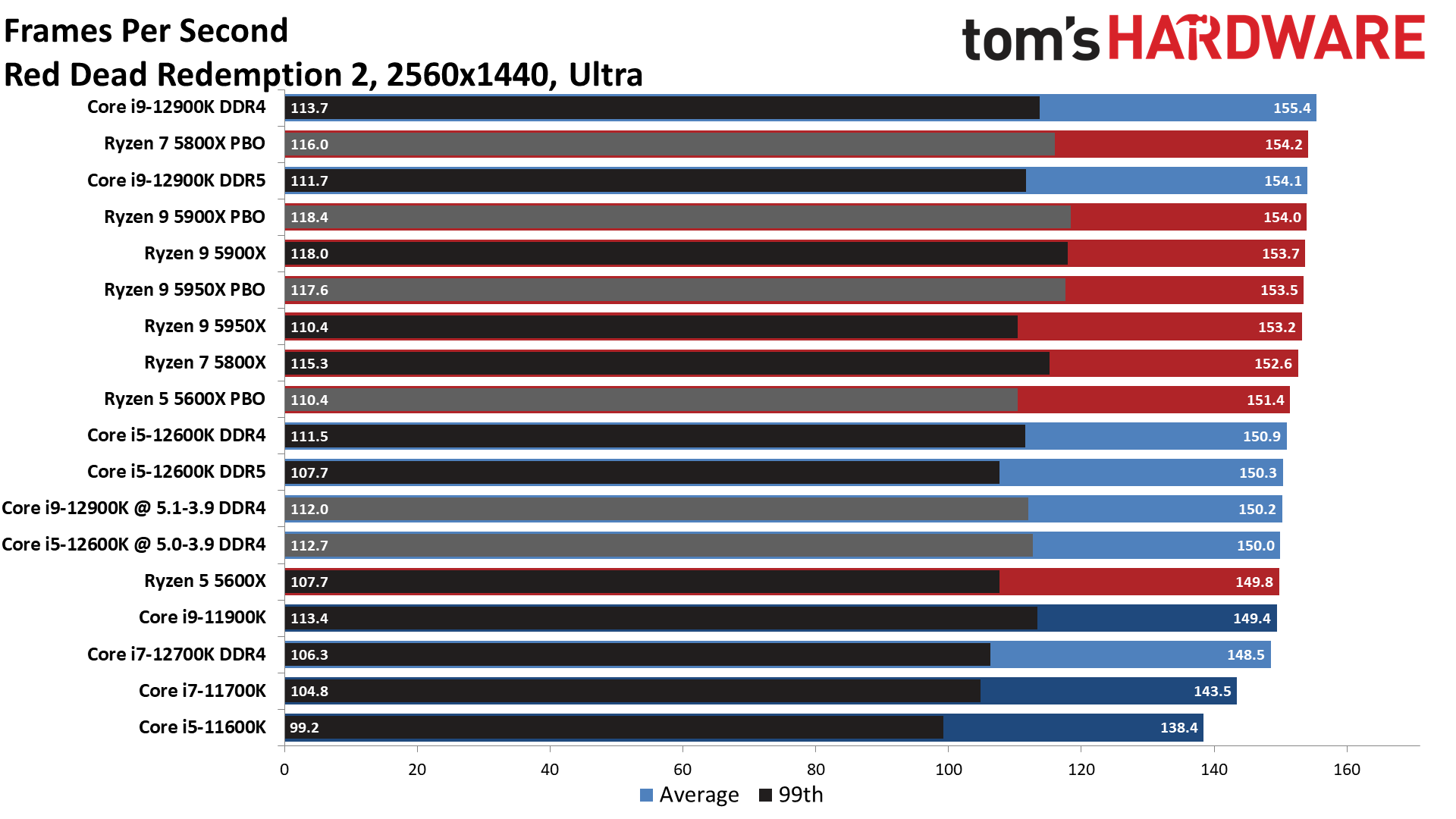
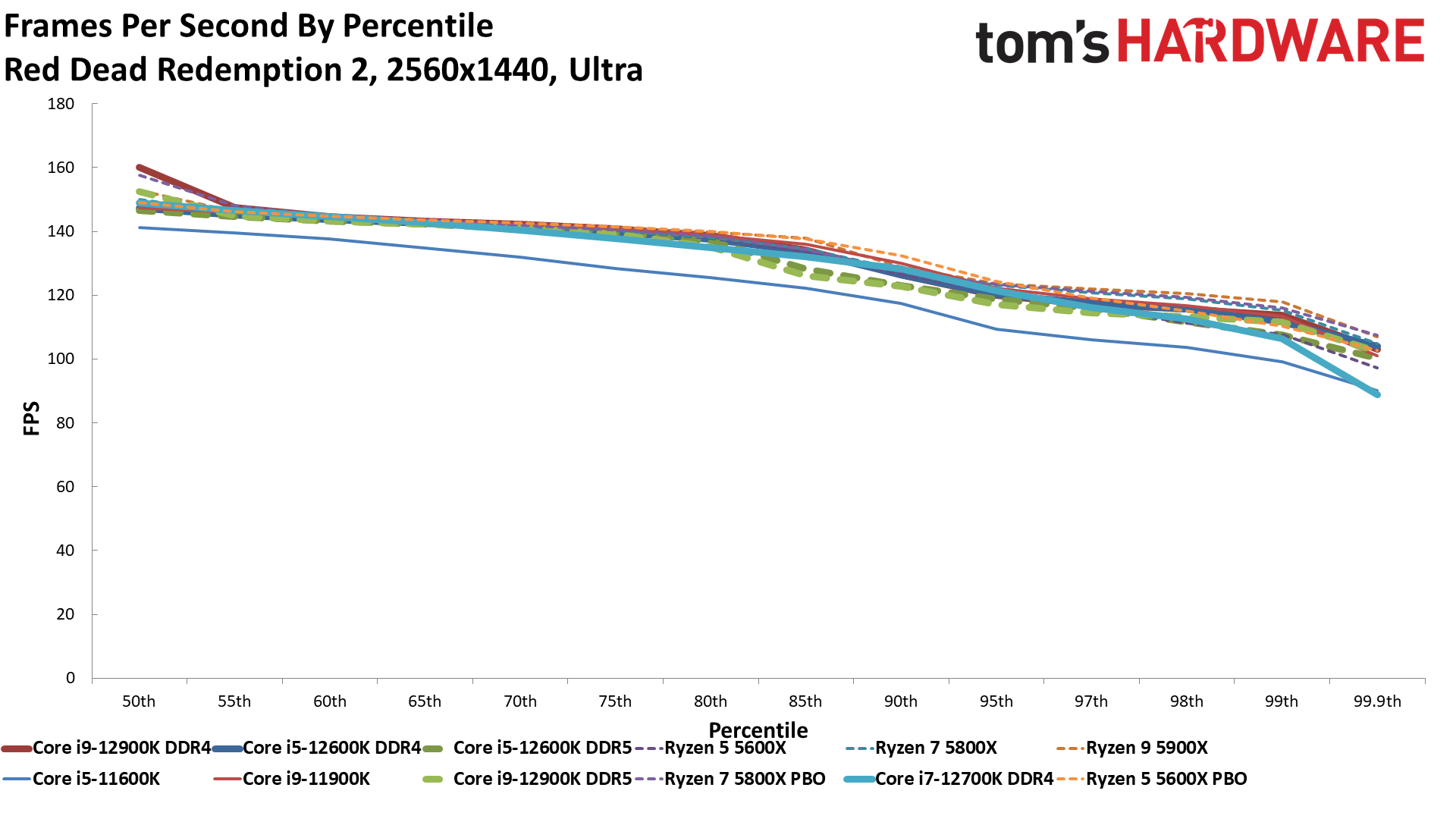
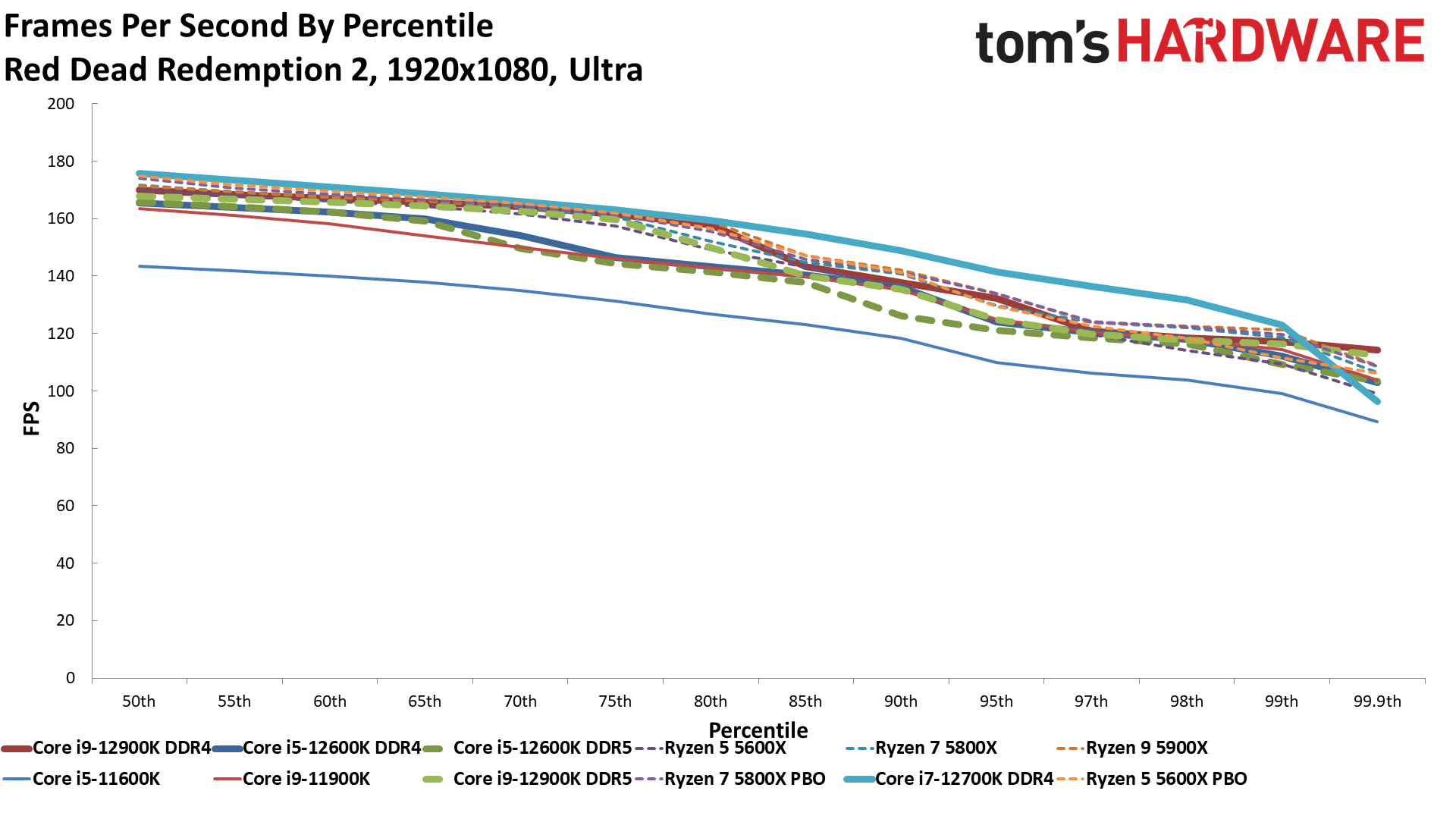
Watch Dogs Legion on Core i9-12900K and Core i5-12600K
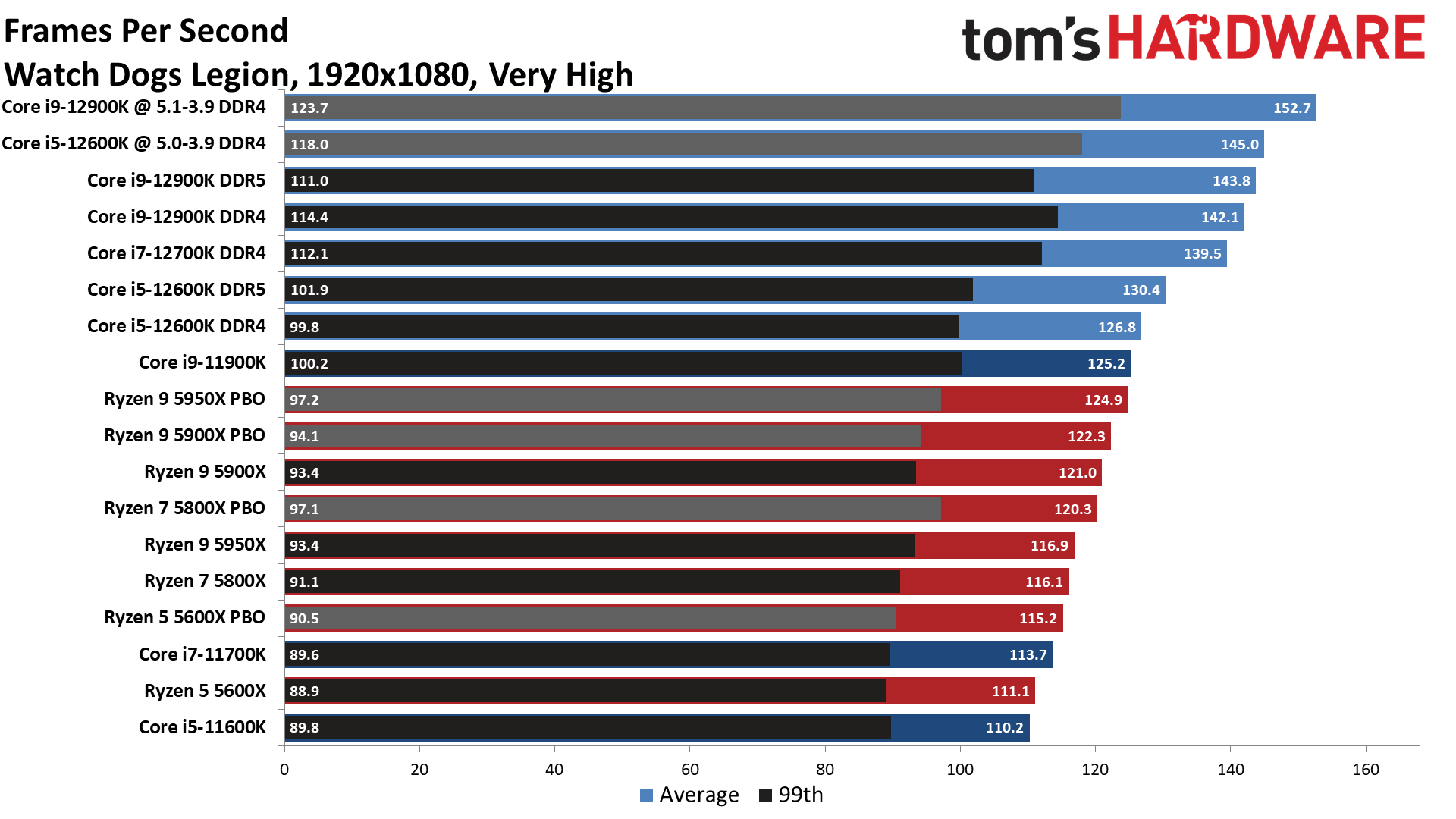
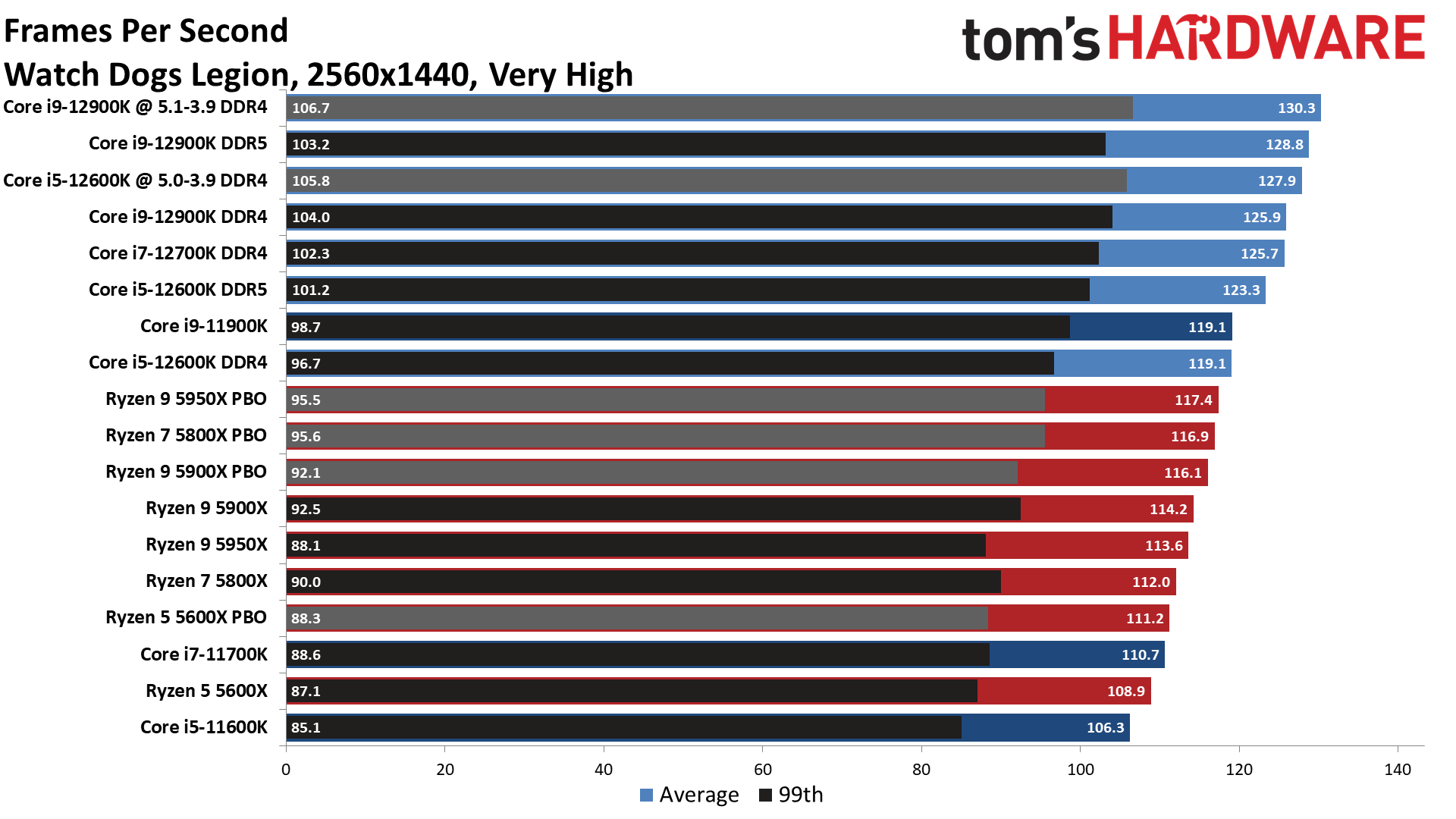
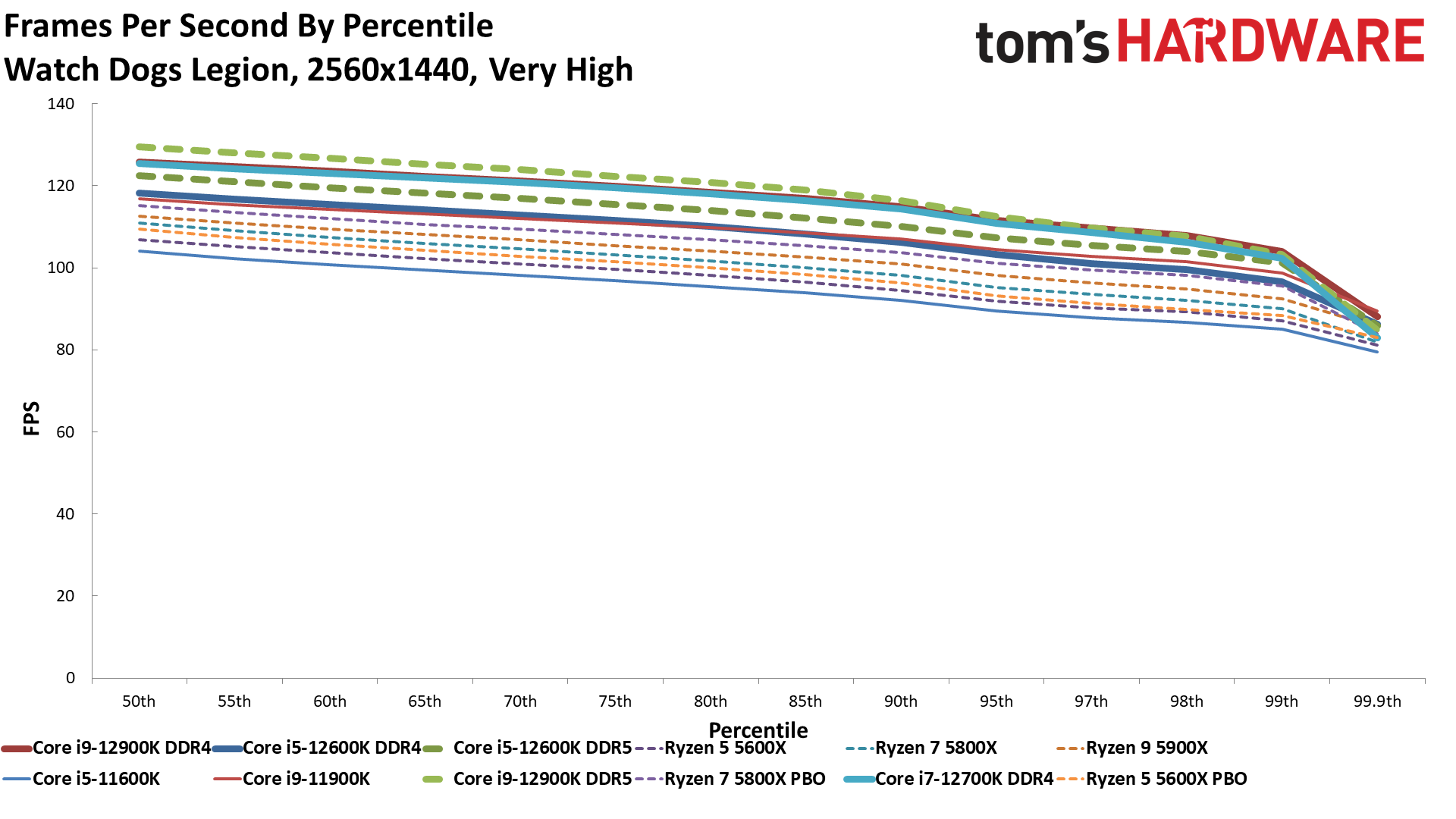
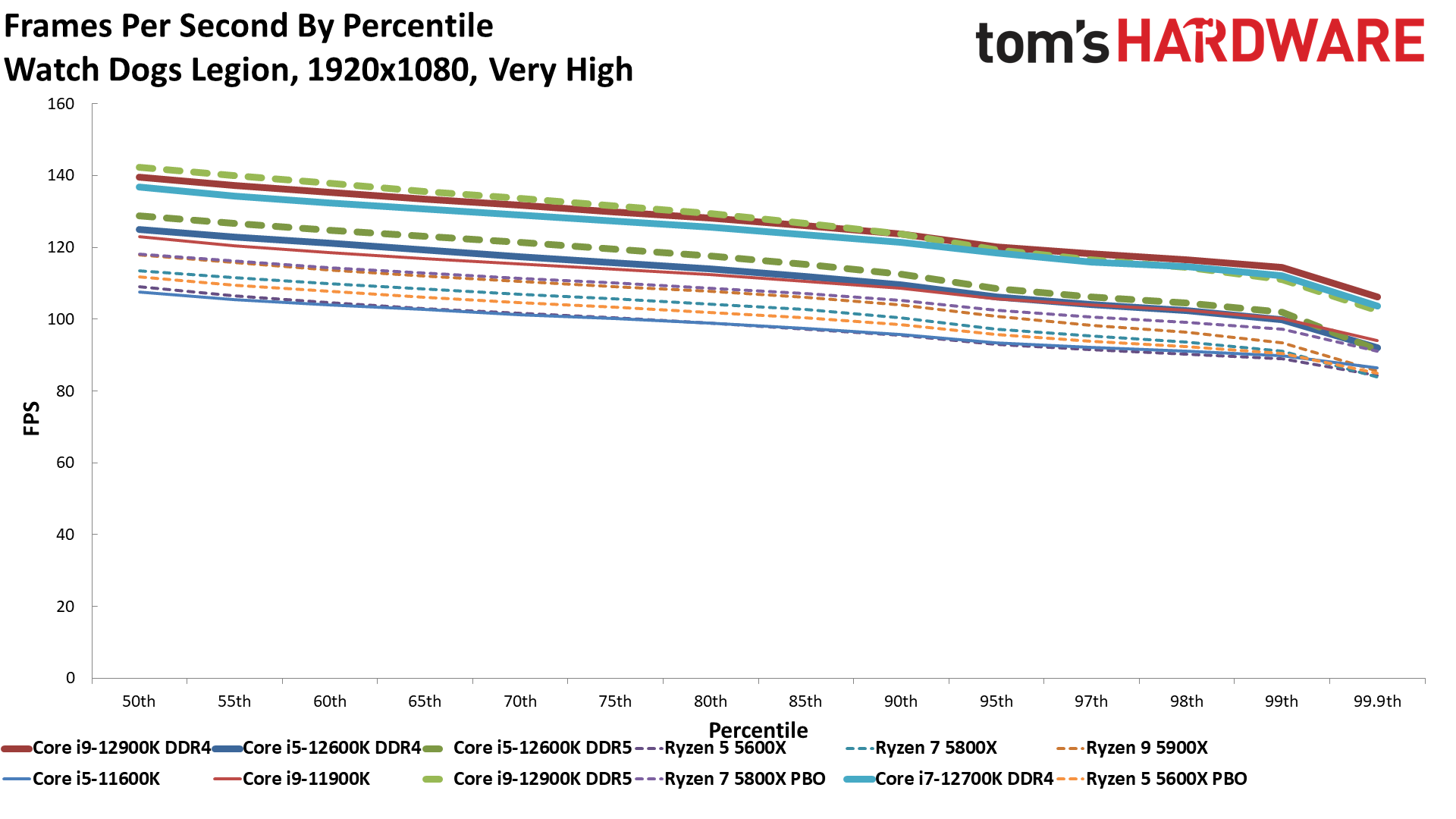
- MORE: Best CPUs for Gaming
- MORE: CPU Benchmark Hierarchy
- MORE: AMD vs Intel
- MORE: All CPUs Content
Get Tom's Hardware's best news and in-depth reviews, straight to your inbox.
Current page: Intel Core i9-12900K and Core i5-12600K Windows 11 Gaming Benchmarks
Prev Page Intel Core i9-12900K and Core i5-12600K Power Consumption and Efficiency Next Page Intel Core i9-12900K and Core i5-12600K Windows 10 Gaming Benchmarks
Paul Alcorn is the Editor-in-Chief for Tom's Hardware US. He also writes news and reviews on CPUs, storage, and enterprise hardware.
-
Alvar "Miles" Udell I'm not so sure it will be a short crown retaking. AMD hasn't shown any indication yet they are officially reducing prices to compete, and with Zen 3+ likely to be more expensive than Zen 3, it may be quite the role reversal with Intel the best value. When Zen 4 becomes widely available in 2023 who knows, but as it stands I'd have a tough time recommending AMD over Intel at this point.Reply -
VforV LMAO, 29 days ago this same guy had this article:Reply
Intel Core i9-12900K vs Ryzen 9 5900X and 5950X: Alder Lake and Ryzen 5000 Face Off
Now he has a "review" of them. Pffft.
Why don't you do another "review" again in 1 month, since intel does not have enough promo pieces already...
P.S. Even with the exaggerated positive press Alder Lake had and has, still is not selling great... Still I see their CPUs in stock at better prices than Ryzen and not moving that stock. I find it hilarious. -
m3city I just don't get it. Maybe I just can't find the right numbers. Maybe I'm cherry picking but when I see:Reply
5900 vs 12900, CPU price somewhat similar.
Cruncher multi 100W@37sec, 170W@107s. Single thread shows better Intel.
Handbrake x264 4 renders vs 3 renders, 130W vs 213W, 151s vs 262s.
Noted, Intel has iGPU - thats BIG, at least for me.
Better CPU overall? As I said, I just don't see it. Intel is bigger, stronger. Not a better athlete at all. -
helper800 I do not know what the others are on about. The new Alder lake CPU's are objectively better at more things than AMDs offerings are vs Alder lake. @VforV Anyone could argue the same about positive press for the zen 1 and 2 products. Personally I am just happy some semblance of competition is back. If you are looking at this with anything other than it being a win for consumers, than you've got brand loyalties that may make you buy into objectively worse hardware. Intel also comes in cheaper at most all price points (with exception to some whole platform considerations).Reply -
VforV Reply
I'm glad for competition, but no Alder Lake is not an outstanding success beating Zen3 from A to Z and at everything and anything. Far from that...helper800 said:I do not know what the others are on about. The new Alder lake CPU's are objectively better at more things than AMDs offerings are vs Alder lake. @VforV Anyone could argue the same about positive press for the zen 1 and 2 products. Personally I am just happy some semblance of competition is back. If you are looking at this with anything other than it being a win for consumers, than you've got brand loyalties that may make you buy into objectively worse hardware. Intel also comes in cheaper at most all price points (with exception to some whole platform considerations).
Like nvidia, intel too has to win back a lot of good will before I even care about them, after all the **** they done in the last 7 or so years.
I rather buy an inferior product than step over my principles and dignity and s*** up to those 2 companies and give them my money for a minority performance advantage (at a point in time). Nvidia is actually worse than intel, but intel is bad enough still.
Coming Zen3D, interest in Alder Lake will drop even more (it already has worse sales than predicted/wanted).
Yes, competition is good, but only because it pushes AMD to be even better than if they did not have at all. That's the only part I care about. -
helper800 Reply
I can respect your opinion, but I disagree. In my opinion companies all do what they can to stay as profitable as they can. Consumer "goodwill" is just another currency these large multinational companies spend and receive for various conduct. AMD currently has a decent amount of goodwill, however, they spent a major chunk of it by not releasing a 5600, 5300, 5700 / 5800 while also increasing prices by 50 dollars across the board. They did this for money and they knew they could get away with it because they had garnered enough consumer goodwill.VforV said:I'm glad for competition, but no Alder Lake is not an outstanding success beating Zen3 from A to Z and at everything and anything. Far from that...
Like nvidia, intel too has to win back a lot of good will before I even care about them, after all the **** they done in the last 7 or so years.
I rather buy an inferior product than step over my principles and dignity and s*** up to those 2 companies and give them my money for a minority performance advantage (at a point in time). Nvidia is actually worse than intel, but intel is bad enough still.
Coming Zen3D, interest in Alder Lake will drop even more (it already has worse sales than predicted/wanted).
Yes, competition is good, but only because it pushes AMD to be even better than if they did not have at all. That's the only part I care about. -
VforV Reply
There is no innocent company, AMD included. I also don't like those same things you stated about AMD that they did recently, but compared to nvidia and intel (on topic), the amount of scummy or s* things AMD did is almost meaningless.helper800 said:I can respect your opinion, but I disagree. In my opinion companies all do what they can to stay as profitable as then can. Consumer "goodwill" is just another currency these large multinational companies spend and receive for various conduct. AMD currently has a decent amount of goodwill, however, they spent a major chunk of it by not releasing a 5600, 5300, 5700 / 5800 while also increasing prices by 50 dollars across the board. They did this for money and they knew they could get away with it because they had garnered enough consumer goodwill.
... so far. And that is what matters to me. It's not like I'm losing so much performance if I use AMD, like it was the case 5-7 years ago, they are either on top or very close to the top, depending on the generation. -
DSzymborski If you want a site that writes articles that only conform to your personal philosophical ideals, you'll need to start up VsHardware.com. It's not the job of a reviewer to review CPUs based on who "deserves" anything, but what the performances are.Reply -
VforV Reply
Sure, I'd love to see that professional impartiality from all the tech sites and YT channels, but the reality is so much different than these utopian journalism rules... which almost no one cares about or abides by them anymore. The trend is actually in the opposite direction.DSzymborski said:If you want a site that writes articles that only conform to your personal philosophical ideals, you'll need to start up VsHardware.com. It's not the job of a reviewer to review CPUs based on who "deserves" anything, but what the performances are.
So in that regard, in a perfect world you would be right.
Then I am also right when I say, everyone that buys a product does it based on it's own preference and subjective feeling and beliefs towards that product.
Thus, we all give or money to those that we think they deserve out money. And we don't give to those that don't.
Which means I don't give my money to those companies that do NOT: in this case, intel and nvidia. At least not until they prove they are atoning for all the s* they did up until now and start to do better. But if they never change and keep doing s*, then it's a no from me. It's as simple as that and I don't see a problem with this whatsoever. I may be in a minority thinking like this, but I know I'm not the only one.